#but is there some respect in which she sees them as a legitimate authority figure?
Explore tagged Tumblr posts
Text
this post is MY “oh man…this doin numbers”. while I have you all here anyone want to hear my thoughts on Out(interrupted by loud foghorn, signaling the breach of an abnormality)
(for those of you interested in hearing some of my Outis thoughts, check the tags. for those not, go in peace 🙏)
one of my favorite things about Dante Limbus Company is that they achieve a level of what I will call “sogginess” rarely seen in the wild (source material), more commonly seen in captivity (fanfiction)…
The insecurity. The inability to understand that they have a positive impact on others without being told outright. The sad, resigned self-deprecation. “I know it’s the same tired old face for you…but here I am” when you re-select them as an announcer (a line which you are literally incapable of seeing during gameplay). The “you guys only love me for my clock 😞” mentality.
Dante wouldn’t ask, “would you still love me if I were a worm?”, because they’d be afraid of a resounding NO.
Not to say Dante doesn’t have their satisfying moments of asserting themselves as manager, but man. What a creature
#I’ve seen people saying that her military mindset gets old after a while#and because of that she’s not that appealing to them#which in theory I get. I think that’s how I feel about Faust a lot of the time#(ie I feel like I see less of her being lame/soggy than the other sinners. but maybe I’m just not paying enough attention)#(but I digress)#BUT I feel like Outis is pretty interesting because a) I have to speculate a lot and b) she does seem pretty lame (positive) in her interact#ions with other sinners#or even the one with Dongrang in Canto IV#her being exceptionally dejected when she can’t play the role of captain in Canto V#whether or not that’s an act it is so fascinating that she got all slumpy and sad before leaving#for all the things she’s said to disparage the abilities of other sinners she did seem somewhat put out about not having their respect#not to mention the Sunshower awakening and corrosion lines.#-> I don’t need…any pointless attention! vs Don’t leave me alone this time (I don’t remember the corrosion verbatim unfortunately)#(but still. my soggy old woman in a fox raincoat)#I think that Outis’ unctuous-ness towards Dante seems like the focal point of their relationship to a lot of people#but even what she says to them in Canto V makes me wonder#is there an extent to which she sympathizes with them?#I mean in Canto IV we see that she doesn’t think especially highly of their abilities#but is there some respect in which she sees them as a legitimate authority figure?#of course with G Corp Outis’ experience of being scapegoated one assumes she has some degree of skepticism towards military hierarchies#I just think it’s also interesting to consider that-#-in addition to just currying favor with her boss she is performing what she sees as her role (supporting her superior)#I don’t even know if this is something super obvious that everyone already agrees on#but local man got a lot of notes for saying things so now he feels like saying things. In Tags#outis lcb#the fact that the Outis canto will be towards the end of the game…stares with my huge orbs#although if Rodya Gregor and Sinclair do actually get elaborated on#maybe Outis won’t get her canto at the End of the game’s lifetime#ok I’m about to discuss how I don’t know how gacha games work#so I think it’s time to stop
317 notes
·
View notes
Note
https://www.tumblr.com/lady-phasma/751676108988088320/the-dance-of-dragons-game-of-thrones-i-wouldnt?source=share
I'm fed up with people who bring out this scene to make people believe that they are right to be neutral...
To an extent this is true, the sides ravaged the land during the war....and then you see that the greens began this war just for their own gain, most of them were responsible for most of the disasters (the riverlands burnings, Strong extermination, Bitterbridge; invitation to Dalton Greyjoy [yes Daemon later invites him, Otto did first and the blacks anticipated so this is "both" kind-sorta]). And later the greens stole the treasury so Rhaenyra couldn't properly feed or "restore" KL as much as you can during an active war.
I think that it's important to remember that Shireen is talking to her father/the man trying to gain the throne thru his maledom and blood relation to the last king AND her entire life has been relatively in the shadows. She's a kid dependent on him raised by both him and her mom to be more or less obedient to authority figures and keep most of her thoughts to herself as to not stir shit, from what I remember. Finally, in Westerosi history, it's been taught ever since the Danc ended that the war was more a tragic travesty that decimated the kingdoms and not that Rhaenyra was a usurper, as Stannis thinks. Yes, there would be some who cite her gender as reason enough for her not to be queen AND by and large women are seen as incapable of fully ruling, the other thing is that the Targs and Robert by extension (bc some have used his Targ grandma to legitimize his rule) derive their claims through Rhaenyra's bloodline. Not Aegon's. And still, she had more supporters based on a head-of-house' right to choose and others to mind their business about it. Aegon was thought of as "grasping" by the respected Grandmaester Kaeth. So again, an unfortunate and catastrophic event where siblings fight each other and the realm (ironic, bc those lords chose to fight ���) suffers for it.
Even if she thought, genuinely, that Rhaenyra was the rightful ruler, she's not gonna tell her dad that (likely). Finally, I don't know if she ever said something similar in the books, I always count down the pages when I read through Davos. Not conducive to fair understanding of characters.
Still, Books > show adaptations. Esp when it's GoT and HotD, both which have adapted the orig characters form not well to horrifically ands way off base. You're just reinforcing Condal's ego thrashing that's already been shown to mirror D&D's.
#asoiaf asks to me#shireen baratheon#agot characterization#shireen baratheon's characterization#stannis baratheon#agot#asoiaf#westeri
8 notes
·
View notes
Text
I never did write and post my thoughts after I finished reading Priory of the Orange Tree but given I've been thinking about the state of the fantasy genre a lot lately - across YA, adult, and "new adult" categories - I figure now is a good time to do that.
I didn't particularly like this book.
And I find this weird to write, because unlike most books I end up disliking, Priory was consistently well written in a technical sense, had a narrative voice I generally navigate towards, and consisted of some genuinely impressive worldbuilding and well-thought-out fantasy concepts.
Yet it took me months to finish it. I even hit a point where I almost DNF'd the entire thing, I was so surprised by my lack of motivation to continue. This book hooked me, presented me with something interesting, and then... completely flat-lined.
While a lot of this could have just been media burnout on my end (you can never really account for how your own personal mood and context when you start something new), I at least know for sure that my lack of enthusiasm had nothing to do with the novel's length. In fact, one of my technical criticisms of Priory is that I think it would have benefited immensely from splitting its story into a series and extending things, fleshing out more of the characters in each of their respective settings, as well as allowing for a lot more build-up towards the climax and eventual intersection of the characters' storylines.
As it stands, those are the areas that felt the most rushed and underwhelming to me. There were several potential instances of conflict throughout the novel that the narrative brushes over or ignores in a way I found particularly disappointing. In a book that grounds itself in examining religious bias, propaganda, xenophobia, and sexism, there were surprisingly few deeper conflicts or tense moments between our main characters. This became especially apparent by the end, when widely accepted histories (and religions) are turned on their heads and most of our POV characters carry on without any sense of fallout, betrayal, or lasting hurt. Each and every character puts aside their personal biases and histories in a way that should feel admirable and satisfying, but instead felt less than believable and even... underwhelming, given the speed with which it was done and the potential (fascinating!) conflicts that those agreements squandered.
I couldn't help but feel that the characters of Priory were either half-baked or intentionally watered down for the purposes of being palatable. Tané, Niclays, and Sabran were (in my totally subjective opinion) the most interesting characters by far; it doesn't escape me that they were also the ones who did, said, and/or thought some of the more uncharitable and even downright terrible things within the novel. Tané's inferiority complex and self-sabotaging nature, Niclays's mixture of pessimism, cowardice, and bitterness, and Sabran's privilege and willful prejudice, all served to make them more fascinating to me. They gave me clear character flaws that made their respective stories more interesting, flaws that stoked my desire to see them improve (or deteriorate) on the course of their character arcs. I found myself disappointed when those arcs became rushed in the final act, those flaws never proving a sufficient obstacle to their dynamics or growth.
Ead and Loth were sadly the worst case scenario. I wanted desperately to like them, but every POV chapter they had seemed to be written by an author terrified to make them in any way unlikable, or even portray them as in the wrong. Ead ends up being completely right about everything; the falseness of Sabran's history, her religion, and her country. Her only missteps result from a lack of information, which she quickly overcomes or is the first to genuinely discover, thus erasing any feeling of culpability that otherwise may have been implied; I never feel any legitimate moments of shame, grief, horror, or regret on her part, because the author never gives her legitimate reason to feel those things. Niclays is interesting in his betrayals and moments of cowardice, and the moments where he overcomes them are all the more meaningful for having seen him falter. Ead, arguably our main protagonist, never really gets something similar. She doesn't make any mistakes, and this is the greatest disservice Shannon could do to her as a character.
I barely know what to say about Loth, mostly because he only began interesting me when he encountered Tané - a dynamic that was cut woefully short and could have been absolutely fascinating if it was deeply explored. Prior to this moment (which had to be in the last 10% of the book, if I remember correctly), Loth is "a walking camera" (quoting a friend). He has characteristics with potential; religious, loyal, and dedicated... but considering the entire basis of his faith is overturned by one of his closest friends, he has shockingly little reaction or issue with this. Due to the important of larger plot happenings, Loth has to dust himself off and just postpone his reaction to the utter disassembly of his religious background for another time - which we are then never able to see. His reactions to most everything are basic, reasonable, minimal, or even dull; he could have paralleled Sabran in his religious prejudice, even showed some effects of his society's religious fanaticism, but he never really seems to - at least, never in a way that truly feels like it's testing him. For all intents and purposes, Loth feels like a character who should be making snap judgments and loads of mistakes, but instead is relegated to keeping those thoughts to himself (even hiding them from the reader) and soldiering on.
Priory was mostly recommended to me based on the impressive scale of its worldbuilding, which was definitely a cut above the rest. I thought Shannon had a firm grasp on her setting and some legitimately excellent imagery for it. I've been made more appreciative of this by the analysis in Global Medievalism by Helen Young and Kavita Mudan Finn, which dissects how Priory (and others) takes the predominantly white interpretation of medievalism and medieval fantasy expands it in a way that's far more inclusive and also far more interesting than much of our modern day "high fantasy" media. I'm not without my criticisms, however; the worldbuilding is another area where the pacing hurts the story, as we only have one 800 page book to get to know the seemingly important settings in which these characters live. That may sound like a lot, but it's perilously little; balancing those vivid worldbuilding details with a packed plot and character arcs meant that, at any given time, one aspect was always getting the short end of the stick.
While I appreciate Shannon's attempts to write with a feminist approach to high fantasy, I think her efforts highlight an issue I have with many similar approaches. Primarily, I find it difficult for a work to address, untangle, disassemble, and analyze misogyny in a setting where they... don't really show it. We're in a state where I think many of us have become (understandably) distrustful of media claiming "realism" or "historical accuracy" to defend its portrayal of violence and various types of oppression, but lately, I've noticed the response to that gratuitousness (in the cases where these things actually are gratuitous instead of just uncomfortable-yet-intentional, that is), is to avoid these things in the narrative almost entirely. That's all well and good; you don't have to include racism, misogyny, ableism, or imperialism in your fantasy world, especially when your desire is to write an alternative escapism to these things.
But when a piece of media is striving to say something about those topics, as I assume Priory does since its driving conflict results from a history of dismissing women's bravery and sacrifice against evil and instead granting the reward of their efforts to a man, then I have to admit, I feel somewhat underwhelmed when the women in the story never face any of the trials I myself deal with in real life. Their male colleagues seem consistently respectful with rare few exceptions; women across the series are allowed to occupy roles from respected advisors to knights trained in combat. Sabran herself seems to be one of the only women deeply impacted by familiar misogynistic mindsets, as she's constantly pressured to marry a man and produce offspring for the continuation of her line. Yet even this could almost be argued to be a special case within the world, since this pressure results from the religious belief that the continuation of her line (through her, the queen, the matriarch) is keeping the main antagonist at bay. This area felt like it wanted to be a subversion to much of the gritty, "realistic" fantasy that plagues the market, but to me, it felt more like indecisiveness. Is there misogyny in this world or isn't there? Is there homophobia in this setting or not? The answer could simply be yes, no, or even somewhat, but instead it felt like a "maybe".
Overall, Priory of the Orange Tree fell flat for me, maybe because my expectations were too high, or maybe because I just wasn't in a place to really dig my teeth into it. Mostly, though, I believe it fell flat because Shannon failed in what I believe to be the most important area of focus in a work: character. I would have traded worldbuilding, plot, imagery, and much more for a cast of characters that felt more intensely raw and complex, that were more unabashedly real in their flaws even if they risked becoming unlikable. Sitting at a 5.5/10
#priory of the orange tree#final comment is I really did enjoy that shannon made the world more inclusive (and not in a tokenistic way like a lot of books do)#but I think fear of writing characters of color and queer characters as potentially bad/harsh/unlikable people killed a LOT of momentum#which is strange because it was working so well with niclays! but then for most others they just felt sort of. there#leia reads#this book also inspired my brain parasite post about asoiaf so that could be part of it#I really like the pov style where characters are unfiltered and can be awful at times#characters in priory just felt sort of held back in that sense (excluding niclays and sometimes tane)#and again only having the one book sort of exacerbated this issue#so much was set aside so we could get to the Final Boss
33 notes
·
View notes
Text
IM FINALLY GETTING AROUND TO THAT CAINE POST WITH HIS RELATIONSHIPS TO THE RANGERS LETS GO
long post so as per usual im throwing this under the cut
Caine & Ortega:
Ortega is caines best friend of years, even after the farm. In fact, caines had a crush on him since their sidestep days, but only realized it in retri lol. He finds his static soothing, its a reprieve from the constant chatter around them, even if it comes with the cost of not being able to read his mind. The problem is that caine is really good at following orders, and during his sidestep days, when they first got all their freedom, he kind of subconciously latched on to ortega as the nearest authority figure because they likened his static to the numbers used at the farm. Even post second escape, they still regard him as an authority(though hes starting to chafe against ortegas influence a little bit more). Part of the reason caine is a no-kill saving step is because, even if they dont realize it, theyre doing what ortega told them to do. if ortega had asked him to kill somebody, hed do it 100%. and if that somebody just so happened to be a near-mythical kingpin ruling over los diablos, well... let's just say theres more than one reason caine agreed to HGs deal unthreaded
Caine & Chen:
Oh, caine has a thing for the marshal and they are throwing a fit about it. This was NOT supposed to happen. Chen was supposed to be the vaguely-tolerable side effect to getting spoon. But then he found out that chens well-shielded mind is actually really nice for the same reasons ortegas mind is, and that he could relate to the feeling of being forced into a role he doesnt want to play. Back in the day, caine was always frustrated that chen didnt trust what he brought to the team, but now that theyre "retired", it doesnt matter and they can relax together as individuals. It was a surprisingly nice development. The two are more similar than they think– nowadays, the main conflict between the two is caine being lycan, because chen is absolutely aware of that fact and caine is just about clear-headed enough to note that thats probably a bad thing. Caine and chen are both very (for lack of better term) career focused, and even if caine doesnt like being villainous, theyre willing to do whatevers needed for the job(over 80% drive babyyy). So yeah, those two are going to butt heads when That conversation finally comes up
Caine & Herald:
Caine is WORKING that 66% strength of mind whenever herald is around. They find him intense, overly curious, and far too forgetful of boundaries, all of which they Do Not appreciate. But he still cant help liking the kid. Hes legitimately proud of how far heralds come along, and hes interested in his potential as a threat since hes shown how perceptive he can be. Currently, theyre trying to round out heralds skills as part of the team, as well as pushing him to analyze and use what he notices against an opponent. Plus, training herald has been more of a lifeline than theyd like to admit(i wrote something about it, but idk if ill post it rip). Its a schedule, hes a good coach, and he just likes fighting for fun lmfao. The whole thing would be great if herald could get some shields for the love of god
Caine & Argent:
Fun fact, caine used to have a small crush on argent between rebirth and retribution. It was a mix of admiration for her skills, the constant attention and the fact that argent is just pretty lol. It faded quick (quickly enough that he panicked in the bridge fight when he realized she was flirting with him lmfao), but they continued to hold a healthy amount of respect for her afterwards, even if they didnt approve of her teamwork. And then the casino happened! Caine had gone through the whole casino infiltration entirely untouched, but when they noticed the fight between argent and shroud, they couldnt help but give into curiosity and see what was happening. That was. a bad decision. He watched shroud attempt and fail to devour argent, and they ended up getting a panic attack and fleeing. He is now scared as shit of her :D! He avoids her like the plague, and whenever hes given an opportunity to escape a room with her in it, hes taking it. They dont know what she is, and they have a bad feeling about finding out
#caine lynzal#sidestep#fhr#ortega#chen#herald#lady argent#FINALLY FINISHED IT#caine is so difficult to play at times but they are so fun to poke at#i cant think of anything more to say#i am Not supposed to be up this late#i am going to snork mi mi mir#goodnight#edit: it is morning and i have one more thing to say#its that caine has something very wrong with him that makes him attracted to people that could kick his ass
12 notes
·
View notes
Note
Just wanted to say I am so very delighted when I see other people talking about SKP (more people need to talk about SKP) and you are right the Land Beyond the Sea is just chef’s kiss. Though of course, all her books are
(Sorry if this is a very strange ask I just… I need more people to be excited about this author)
Not weird at all, and I am so glad you sent me this ask because I love Sharon K. Penman! She is one of my favorite authors, and there is no one else out there who did it quite like her. When she died a few years back I was absolutely gutted. I'm pretty sure I read her Welsh Princes trilogy first, which starts with Here Be Dragons, at least 14 or 15 years ago by now, and she was my gateway drug into genre fiction when before that I'd been a bit of a literary fiction snob. I even started reading fantasy because I wanted more epic tomes with various points of view like Penman's books, but to this day I have never read a historical or fantasy author who really does it quite like she does. I have so much respect for the sheer level of research she put into her work, footnoting every time she changes a name or chooses from one of two dates, or when the facts of some event are disputed. Of course, she interprets things a certain way and fills in certain blanks in the record as all historical fiction writers must, but she never outright invents stories from whole cloth and never villainizes historical figures when she could instead humanize them.
I have a lot of asoiaf/grrm mutuals and I cannot stress enough how much you should read Penman if you enjoy the historical/political intrigue-y aspects of ASOIAF as much or more than you do the magic. I recently decided to just re-read When Christ and His Saints Slept after realizing that what bugged me about the Dance of the Dragons was that it was so much stupider than the Anarchy. The added bonus with Penman is that you will legitimately learn a lot about the time period and the basic outline of people and events because she adheres very closely to the historical record.
6 notes
·
View notes
Note
What's something your muse struggles with in relationships?
... so much . quilge is not a very social person . he actively isolates himself a lot . of course , he does like being alone . he is so used to being this dominant , intense figure of authority . he also kills his own men ; he doesn't see anything wrong with killing someone he deems , in his eyes , a "weakling" or a "coward." he barely respects them . his other sternritter fare better , but there are certainly numbers of comrades he outwardly doesn't like . he looks down on a lot of his other quincy comrades . he's pompous and smug . he doesn't LIKE a large number of people ( namely , if i were to write with other characters from canon , there's not many people who he would legitimately like as friends TBH ? if that makes sense ) , no matter who they are . quilge is such a hater . that's a big part of his problems , i think . he's obsessed with strength and running things his way . it's why he's a prison warden , tbh .
he rarely maintains friendships . he killed his family , as per a consensual hunting ritual . everyone is mostly at arms-length from him . if he isn't in his awful hell-dungeon of pain ( which is underground ) , he's outside somewhere hunting or skinning something or snapping its bones or running a hook through its body or carving its meat up to prepare to eat ... or he could be going over his weapons armory ! he loves to collect weapons . he likes sharp things that kill people .
various outliers to anti-social tendencies , of course , are as follows : @guadanya ( his lover & husband ) , @za-baransu ( his grandmaster & brother figure ) , @lichtreich ( his majesty and father figure ) , @zombiigrl ( his adopted baby sister ) , @phobiael ( fellow sternritter and weirdo ) , @deathleads ( his bestie & just someone who connects with more than the usual person ) , @fractise ( another friend & someone whos work he finds fascinating ) , frederik ( whos URL i forgot </3 , but he's his soldat ! ) & @soldatworships ( his other favorite soldat ) . special mentions go to @cinghialefedele , who quilge sort of looks out for as nnoi's little guy , and even ... @fenixias , though their relationship is ... VERY TENUOUS , dangerous and not based on trust . they have a rather complex and layered relation , but quilge regularly talks to her . i MIGHT have forgotten some people , but MOST of the other people i can't name off of the top of my head , he doesn't outwardly like . tbh . full on , he is just a fucking jerk ( i'm sorry if i forgot someone , truly BNJKFEAJKNRHERSFDK ) .
highlights of his relationships included ... quilge experiencing actual , legitimate romantic love with nnoitra , someone who was supposed to be his enemy , the antithesis of his kind . they did always try to kill each other numerous times , of course , before nnoitra was captured . hell , even after he was captured , nnoi kept on trying to eat him alive . another interesting moment is when quilge tried to kill yhwach when they first met . he had flown into such a massive bloodlust , an intense battle high , that he couldn't be brought back down . one tiny detail i hold dear is quilge and gigi exchanging gifts . he still uses his mace that she gave him for christmas !
incoming quilnoi section :
although , in terms of his main romantic / sexual relationship with nnoitra , therein is arguably the most intense dynamic . they've been through a lot , both apart and together ; it would take a severing to really pry themselves off of one another . but , as many of us know , their relationship isn't the most healthy or balanced ( ex. they can argue and that usually winds up with SOMEONE being tossed through several walls . quilge is obsessed & very possessive with nnoitra , he would kill his own men just to be with him . . nnoitra is also possessive , willing to kill people for looking at quilge for juuuuust a bit too long ... among other examples . ) , even if they do love each other . even if they find solace and relate to one another . and i don't really think it could ever be sunshine & butterflies . they're both extremely bloodthirsty & insane evil men , with bouts of gentleness & understanding , learning between themselves , navigating their unorthodox relationship . but they certainly have their moments .
quilge is just ... sort of this NIGHTMARE of a man to deal with , though , in all honesty . he holds intense anti-social aspects , and prefers to be on his own , or in the command of others . he lacks respect , or just outright ignores it . if he isn't belittling you , he's probably THINKING about it , if not thinking about committing murder . he doesn't relate to others well , and has worked in / spent time in some of the most dire , disgusting situations . he would rather skin and bone an animal than talk to some people , and that's absolutely a quilge problem .
#he is just . a lot . he's so much#he struggles with these things & ignores that he needs help </3#[ 𝖎𝖒𝖕𝖗𝖎𝖘𝖔𝖓𝖊𝖉 . ] | | | headcanons .#queue .#ASK TO TAG .
8 notes
·
View notes
Text
Happy Easter! The good news is that salvation is bullshit!
So, well, it's not like anyone needs my approval to have whatever religious beliefs they have.
But today, Easter Sunday, I would just like to state for the record that I intensely disagree with and morally disapprove of the idea of sin and the idea of hell.
(Which means I also disapprove of any concept of salvation which is salvation from the whole "the wages of sin is death" thing.)
First off, the concept of right and wrong should be one of harm caused to actual people or things in the the real world, not of defiance of arbitrary rules created by an authority figure. Children feel bad when their parents are unhappy with them because their parents have the power to punish them. Sin and hell are taking these dynamics and projecting them onto God the Father. It's not real. It's not real ethics. When you're a kid, playing loudly when your mother has a headache and needs quiet isn't bad because your mother is an authority figure and she might get mad at you, it is exactly as bad, no more no less, than causing anyone who does not have authority over you extra suffering while they are not feeling well.
Suffering is bad (really shocking take I know), attempting to alleviate suffering is good and causing more suffering on purpose or through insufficient caution are bad. And some other things: respecting autonomy (letting people live their lives as they see fit) is good and denying autonomy is bad. Truth is good and deception is bad. Tending to the interdependent web of existence on earth is good and disrupting it is bad. All of these are in tension with each other all the time, but none of them should be in tension with obeying or defying the will of a made up super-parent.
(Am I saying God is not real? Not really. I think good people can believe in God or not believe in God, it's orthogonal to morality. Am I saying that conception of God is not real? Definitely.)
People will talk as though obedience to authority is a reasonable substitute for coherent ethics. It's not. For one thing, notice I claimed autonomy as a core value? Find that in the Ten Commandments. (It's not there. Nor is any reference to sexual violence, even though popularly everybody thinks sexual violence is one of the worst things people can do to each other.)
For another, the motivation is all wrong, people who follow moral rules to avoid being punished are fundamentally being selfish, and going from a selfish avoid-pain-supplied-by-authority motivation to a "other people have feelings and interiority" motivation is not that easy (it's actually much more direct to go from "this is what I find good or bad for me" to "maybe other people find similar things good or bad for them?") and "well I have a conscience, if I do bad things I feel guilty" isn't actually morality, it's just internalizing what other people want you to do, it's having a cop in the head. It's the "my parent will punish me" dynamic all over again. (I am acutely aware of this because my conscience makes me feel bad for things that are not actually ethical issues all the time, mostly about not being productive enough, and other times I'll do things that rationally I think are harmful and not get feelings of guilt. It's internalized authority, it's not ethics.)
For a third, sometimes when people do things out of fear of authority they are morally bad things. The Holocaust was a thing a government did. Wars are things governments do. Colonization is a thing governments do. Slavery. Baby snatching. Residential schools. Comfort women. The Crusades and the Inquisition were driven by the Church (and it's not like Christians are uniquely capable of committing atrocities in the name of religion either. Just that in the last several centuries they've had a tremendous amount of power.)
For a fourth, coercive authority is inherently bad. We understand coercion is bad when there is no "legitimate authority", we know that a schoolyard bully is not right for beating up a loner kid and we know muggings aren't right and armed robberies aren't right and we know you can't just tie someone to a chair and tell them you're going to hurt them until they agree to do everything you want them to under normal circumstances and pretend that's morally OK. But suddenly when there's a "legitimate authority" it's ok to torture and imprison people against their will and generally force people to do things they don't want to do? No. "Why do we kill people who kill people to show that killing people is wrong" extends to lots of things beyond the death penalty. Why do we hit kids to show that hitting kids is wrong? Why do we take people away from their families and everything they find enjoyable in life for causing some form of harm to others (at most justified) or because they stole or damaged someone's property or because (least justified) they got caught with a bunch of drugs on them? Why do we frown on gangs but fund police forces, which operate basically the same way as gangs? Why do we frown on killing people at home but give them medals and discounts at restaurants for killing people abroad?
You ever listen to someone with a child or a pet going off about "good girl" and "good boy"? You notice how it's almost never about actual morally right behavior, it's about what's convenient to the adult human? The cat eating your sandwich is "bad". (You being late to feed your cat is just your cat being funny for being so melodramatic over food though.) But a cat eating the food it can find is not being bad at being a cat, nor is it being unethical. It is doing what cats do to survive, and in as much as ethics even apply to cats that is actually being a good cat. If anything the human was being a bad human for leaving the sandwich where the cat could get to it. But the "nice" thing about being a pet owner is there's no one standing over your shoulder telling you you're doing it wrong, so you get to blame your cat for your bad behavior all you want. Or your dog. Or your child.
Kids should run around and be loud a lot of the time, and have their own wants and needs that are independent of their parents' wants and needs. Kids mostly should take care of their needs and learn and grow, including needs for play and for making friends and for getting attention and having new experiences. And learning for instance what happens when you fall from climbing all over something that was not designed to be climbed on.
And adults should...do things adults need, and as we're able help other humans get things they need when either it's likely to get reciprocated or when someone's in a situation where their needs vastly outstrip their ability to return favors. (And maybe not wreck the planet? That would be nice.)
Many Christians think that life on Earth is some sort of dress rehearsal or test before the main event of Heaven. But Earth is all we've got. And part of that is Earth functions on a cycle of life and death. Your body functions because cells have a life cycle and die and get replaced. And your ecosystem, such as it is, functions on organism having a life cycle and dying and getting replaced. And the biosphere, the entire living part of Planet Earth, functions on organisms having a life cycle and dying and getting replaced. We do die. The world will someday die. That's not the price of sin. It is the price of being alive.
And it is a cycle. I don't think we come back as us in any meaningful sense. Heck, I'm not entirely sure that the concept of an identity that spans a lifetime is not mostly illusion. But life comes back. The seasons cycle and the days cycle and the moon (the months) cycle and the cells die and new ones are born and organisms die and new ones are born, it cycles.
Now the green blade riseth/From the buried grain.
And Earth is our home. It's not some place out there that has no suffering or death or change, where everyone is frozen in place and does not grow. (It's not after the Revolution either, it's now, capitalism and everything.) It's HERE, with the suffering and the sickness and the disability and the death. (And the new life, and the growth, and the healing, and change change change change change change.) It's here. It's here. It's here.
#Christian critical#heresy#Easter rant#sin rant#hell rant#if I was brave I would post this to Facebook#ah well
1 note
·
View note
Text
And there was only One Bed - Tears of Themis Headcanons
Premise: There’s only one room left in the hotel, meaning the guys have to be roomies with MC for a night.
Luke
Err… his cheeks are red now.
He’s having to check with MC if she’s okay with it. Not that they had much of a choice.
They take the room, only to discover one bed.
And forget his crush on her; that’s the least of his problems.
He knows she shifts in her sleep.
“You take half and I take half?” MC offers. “Like when we were kids?”
He sighs, lamenting his fate. “I’m so gonna end up on the floor.”
“Sorry.”
When it comes to who showers first: rock, paper, scissors.
He’s the least phased of all the guys by the whole “share one bathroom” situation. They grew up together. They sometimes used to have quick conversations through the bathroom door, normally just a question or two about what they wanted for dinner or if their phone went off and it was their parents.
Which happened this time. “There was a vending machine down stairs. You want anything? And if you mention that diet, I’m getting you two of your favorite candy bars.”
“Just one and only one.”
“You got it.”
(@gavin-plz-call-me once called them the “King and Queen of No Boundaries” and I will never forget it.)
Eventually, Luke makes sure MC’s settled in for bed while he’s planning to stay up a little and figure out tomorrow’s game plan.
Until she literally drags him to bed.
He can’t protest against her.
Contrary to what he thought, he did not end up on the floor.
But it was kinda hard to sleep when the girl of his dreams decided his chest was her new snuggle pillow halfway through the night.
He’ll cave and roll with it. Be selfish just for tonight and hold her there.
Come morning, she apologizes for disrupting him, he dismisses it. And both their cheeks are red.
But it doesn’t phase them. Give it half an hour, they���re back to normal.
(Bonus: “So, kid. Let me get this straight,” Aaron Yishmir started. “You spent the night with her, and you’re still not gonna tell her anything?”
“It wasn’t like that!”
“You’re hopeless.)
Vyn
Well… this is a predicament.
However, they come to some awkward agreement that if it’s the only place to sleep for the night, they’ll take it and figure it out as they go.
However, things only go from bad to worse when they learn there’s only one bed.
There were very few times since becoming an adult that Vyn ever found himself at a loss. And this was one of those times.
“Um… are you comfortable splitting?”
His glasses almost fell off his face at MCs suggestion.
Before he can even think about suggesting to take the chair, MC is putting up a blanket wall. “Like this?”
Er… aha…
Oh geez, this woman…
He caves to that deep, ugly part of him that’s begging “yes” and agrees.
Then comes the new revelation there’s only one bathroom, which rose the question of who was going to shower when.
He just lets her take the first shower while his mind is still storming.
During that time, he realizes this may be the only time he has the privacy to actually record his voice diary.
It’s a total disaster. He’s in mental turmoil and can barely think straight.
But MC is acting normal, meaning he’s got to try to act normal.
Normally, he takes his showers in the morning, but he takes it at night this time just so he can have another moment of privacy to get his thoughts in order.
This is just a practical arrangement. This is just a practical arrangement. This is just a practical arrangement…
Bedtime rolls around, and poor, unsuspecting Vyn believes they are each going to stay on their respective sides of the bed.
However, Author has a headcanon these two both sleep like dead logs.
Morning rolls around, and they’re still both asleep, only they’re totally entangled.
MC wakes up first, laying on top of Vyn.
And when she freaks, flailing and falling off the bed in the process, that’s when Vyn wakes, too.
It was… an interesting morning to say the least.
They come to the agreement to never speak on it again.
(Until a few years down the line after they’re together and can look back on that day with amusement.)
Artem
When the person at the front desk said there was only one room left, Artem about had a heart attack.
He cannot possibly share a room with MC. That’s super improper.
Will call around to any other hotel in the area, but no avail.
MC will literally have to drag this poor man up to the room.
“It will be fine, Artem.”
Except, it wasn’t. There was one bed.
Cue almost heart attack number 2.
He almost left to go sleep in the car. MC had to restrain him.
“We can share right? Like, if we—”
“No. Absolutely not.”
“Not even if we put a blanket—”
“No. I’ll sleep in the chair.”
There was no convincing him to sleep anywhere else.
And MC tried.
Eventually, she had to surrender. “Fine. Then do you want the first shower?”
Oh… there was only one bathroom… that they’d be sharing…
Cue almost heart attack number 3.
Will legitimately leave the room while she’s showering. He just feels too awkward and like he’s invading her privacy.
Then bed time rolls around and he’s unable to sleep, so he works on his laptop for the time being.
Ends up pulling an all-nighter, which MC anticipated.
She set an alarm for early in the morning so she could then force him to bed for a few hours.
While he insisted he was fine, he was too tired to protest as she pushed him down into bed. “Sleep, will you. I know you didn’t sleep all night.”
Thought he’d have trouble, but he was so wound up all night over everything that had happened that he’s passed out in fifteen minutes.
And stayed out cold for a few hours.
When they left, MC made sure to thank him for being such a gentleman. She thought it was the least she could do for his troubles.
That, and she quite liked the way his ears and neck turned red.
(Bonus: He hopes Celestine never finds out what happened on that business trip.
But when she finds out curtesy of MC, she will never let him live it down.)
Marius
The moment he finds out there’s only one room, he actually gets super flustered.
And as he does, instantly goes in to deflective Playboy Flirt mode.
“Get your head out of the gutter, you little—”
MC shut that down, real quick.
Most he could do then is just say “It can’t be that bad, right? What’s the worst that could happen?”
Well, apparently only be one bed.
Flustered Marius = Playboy Persona
“That’s it,” MC says. “You take the bed.”
“What? Don’t you wanna share?”
“No.”
“Ouch!”
But really, he wants to find some way to get her to take the bed because he really will feel awful otherwise.
Then comes the single bathroom realization.
“You wanna shower together?”
“Marius, I swear I will kick you out of this room and take the keycard from you.”
“Oh, my feisty Miss Attorney.”
“Miss Attorney will sue you for sexual harassment.”
“Understood.”
He gets to shower first, and then ends up giving her some excuse for leaving the room entirely.
He loves teasing her, but this might be the most he’s ever pushed his luck. And he actually doesn’t want her to hate him, so he’ll give her this space at least.
As for the bed situation…
MC tries to sleep on the couch, but he can’t stand it, so he decides to push his luck and simply carry her to bed.
“I won’t pull anything, I swear.”
“The only reason I’m agreeing is because I know I’ll sleep better here than the couch.”
“See?”
“Marius.”
“I’ll shut up.”
Regrets his decision halfway through the night when Mr. Light Sleeper realizes Ms. Dead Log moves in her sleep.
She was snuggled up against his back, and his heart was going doki doki too hard to even think about going back to sleep.
Eventually, he rolls over and snuggles her, not just because he wants to, but he hopes it will keep her still through the night.
Unfortunately, she was not happy in the morning.
“Can’t we talk about this?”
She kept her face turned away from him the rest of the day, but he knew it was red with blush. “Shut up.”
#tears of themis#luke pierce#vyn richter#artem wing#marius von hagen#headcanons#tears of themis headcanons
1K notes
·
View notes
Text
for @pink-lightsabre Prompt “Zuko and gaang+ “That was ONE Time.” (following last year's au HERE, but not directly) (really not as much Zuko as intended sorry) Being a prisoner of the Fire Nation was weird, Sokka had settled on. Not that they were, officially, since it turned out the Prince was banished. Zuko didn't actually have much authority except on this particular boat, but he and his sister and the weird bald kid that they'd pulled out of the ice after said boat had crashed into a glacier were very much on the boat. So, as much as Katara and Aang--who was apparently the actual avatar, somehow Katara had known!-- were trying to pretend this was an adventure, Sokka did not let himself forget. No matter how nice the old guy who kept making them tea was. Still, it was hard to be as terrified when General Iroh had kept promising him that no one was going to=separate them. It could all have been an act, though if it was, that didn't explain why no one had questioned him about Water Tribe locations or defenses. Not that they had any defenses, anymore. Sokka knew it was up to him, just like his dad had said. Get Katara out of this mess and back to the village. Protect her, and her secret. The soldiers on board had followed the General's lead when it came to the three prisoners, which mostly meant leaving them alone and only really paying attention if it looked like they were trying to go somewhere like the captain's quarters, or the armory, or above deck, which still left a whole dining area, halls, and a couple of storage rooms. It meant that Sokka had managed to map pretty much the whole boat out in his head, and had gotten some real sailor gossip alongside. They'd been 'invited' to eat the night meal with Prince Zuko and his uncle again. Well, Sokka was pretty sure they could have refused, but didn't want to push it until they'd figured out a solid escape plan, which was going poorly. Aang was convinced that the whole war could be ended just as soon as he had a Talk with the Firelord. Sokka was not eager to see that chat. The food was good, steaming hot and spiced. Aang poked through his bowl of noodles as Sokka wolfed down the fish in his bowl. "I told the cook to make yours without fish," the General answered an unspoken question. "I should have known sooner that you wouldn't have enjoyed last night's supper. It was not very hospitable of me." "Oh," Aang said brightly. "Thank you." He nudged Katara, who was still wary of all this, even if she was more optimistic than Sokka was about how this was all going to end, eventually. "See? The Fire nation can respect other beliefs." Sokka noticed how the General shifted a bit on his knees at that, lifting his cup of tea. He noticed how the Fire Prince scowled at his own plate. "Avatar Aang," Iroh said. "I think, perhaps you should guard your hopes. My brother does not listen to me." "You're his family," Aang said, frowning when the prince glared. "The Firelord does not obey the whims of family. And the Fire Nation does not have to bow to --" he started, the candles shifting with his rising voice. "Easy, Nephew," Iroh said. "Now is perhaps a better time for discussions like this, but not the best." "Then when?" Zuko asked. "I am bringing my father the Avatar. This isn't a Social visit for you." Sokka flinched. There went what little freedoms they'd had. In the corner of his eye, he saw Katara flick her fingers, back and forth, and saw the broth in the bowls move. Oh, no. He couldn't let her attempt at waterbending be noticed. They'd kill her, like his mother. "Maybe it should be," he said, bringing all the attention squarely on himself. "We could be allies." He did not want to ally himself with anyone on this boat, no matter how friendly the General seemed to be, but it was only fair to fight trickery with trickery. He lead with the only bit of gossip he'd heard that might have proved legitimately useful "I've heard, you spoke out against Fire Nation cruelty before." "That was one time." Zuko spat, rising. His robes, shot through with gold, caught the candlight. "I will not make that mistake again. " Katara put her hand to her necklace. Aang stared up at Zuko from the eating mat, his gray eyes soft. He spoke quietly. "I don’t think standing up for your people is a mistake. I don't think you think so either.”
16 notes
·
View notes
Note
I keep seeing people calling Good Omens queer bating and a I can't help but ask why? I read the Aziraphale/Crowley relationship threw an Ace lens and they are clearly as close to married as they are probably going to get without stepping on holy ground.... and they love each other... why is it considered queer bating?
Personally, I think it's mostly young queer fans turning legitimate grievances on the wrong target. A case of getting so fed up with queerbaiting in media as a whole that they're instinctually lashing out at anything that seems to resembles it on the surface, without taking the time to consider whether this is, in fact, the thing they're mad at. Good Omens is a scapegoat, if you will. The equivalent of snapping at your partner after a long day. Your friend was an asshole, your boss was an asshole, the guy in traffic was an asshole, and then you come home to your partner who says something teasing and you take it as another asshole comment because you've just been surrounded by assholeness all day, to the point where your brain is primed to see an attack. Your partner wasn't actually an asshole, but by this point you're (understandably) too on guard to realize that. Unless someone sits you down and kindly reminds you of the difference between playful teasing and a legitimate insult - the nuance, if you will - your hackles are just gonna stay up and you'll leave the room, off to phone a different friend to tell them all about how your partner was definitely an asshole to you.
Only in this case, that "friend" is a fan on social media doing think pieces on the supposed queerbaiting of Good Omens, spreading that idea to a) people who aren't familiar with the show themselves and b) those who, like that original fan, have come to expect queerbaiting and thus aren't inclined to question the latest story with that mark leveled against it. Because on the surface Good Omens can look a lot like queerbaiting. Here are two queer coded characters who clearly love each other, but don't say "I love you," don't kiss, don't "prove" that love in a particular way. So Gaiman is just leading everyone on, right?
Well... no. This is where the nuance comes in, the thing that many fans aren't interested in grappling with (because, like it or not, media is not made up of black and white categories; queerbaited and not-queerbaited. Supernatural's finale is proof enough of that...) I won't delve into the most detailed explanation here, but suffice to say:
Gaiman has straight up said it's a love story. He's just not giving them concrete labels like "gay" or "bi" or "asexual," etc. because they are literally not human. Gaiman has subscribed to an inclusive viewpoint in an era where fans are desperate for unambiguous rep that homophobes cannot possibly deny. The freedom to prioritize any interpretation - yes, including a "just friends" interpretation - now, in 2021, feels like a cop-out. However, in this case it's an act of world building (they are an angel and a demon, not bound by human understanding of identity) meeting a genuine desire to make these characters relatable to the entire queer community, not just particular subsets. Gaiman has said they can be whatever we want because the gender, sexuality, and romantic attraction of an angel and a demon is totally up for debate! However, some fans have interpreted that as a dismissal of canonical queerness; the idea that fans can pretend they're whatever they want... but it's definitely not canon. It is though. Them being queer is 100% canon, it's just up to us to decide what kind of queer they are. This isn't Gaiman stringing audiences along, it's him opening the relationship up to all queer possibilities.
We know he's not stringing us along (queerbaiting) because up until just a few days ago season two didn't exist. Queerbaiting is a deliberate strategy to maintain an audience. A miniseries does not need to maintain its audience. You binge it in one go and you're done, no coming back next year required. The announcement for season two doesn't erase that context for season one. No one knew there would be more content and thus the idea that they would implement a strategy designed to keep viewers hooked due to the hope for a queer relationship (with no intent to follow through) is... silly.
In addition, this interpretive, queer relationship between Crowley and Aziraphale existed in the book thirty years ago. Many fans are not considering the difference between creating a totally new story in 2019 and faithfully adapting a story from 1990 in 2019. Good Omens as representation meant something very different back then and that absolutely impacts how we see its adaptation onto the small screen. To put this into perspective, Rowling made HUGE waves when she revealed that she "thought of" Dumbledore as gay in an interview... in 2007. Compare that to the intense coding 17 years before. Gaiman was - and still is - pushing boundaries.
Which includes being an established ally, particularly in his comics. Queerbaiting isn't just the act of a single work, but the way an author approaches their work. Gaiman does not (to my knowledge) have that mark against him and even if he did, he's done enough other work to offset that.
Finally, we've got other, practical issues like: how do you represent asexuality on the screen? How do you show an absence of something? Yeah, one or both of them could claim that label in the show, outright saying, "I'm asexual," but again, Gaimain isn't looking to box his mythological figures into a single identity. So if we want that rep... we have to grapple with the fact that this is one option for what it looks like.
Even if he did want to narrow the representation down to just a few identities for the show, should Gaiman really be making those major changes when he's only one half of the author team? Pratchett has, sadly, passed on and thus obviously has no say in whether his characters undergo such revisions. Even if fans hate every other argument, they should understand that, out of respect, Good Omens is going to largely remain the same story it was 30 years ago.
And those 6,000 years are just the beginning! Again, this was meant to be a miniseries of a single novel, a novel that, crucially, covered only Crowley and Aziraphale's triumph in being able to love one another freely. That's a part of their personal journey. Yeah, they've been together in one sense for 6,000 years, but that was always with hell and heaven on their backs, to say nothing of the slow-burn approach towards acknowledging that love, for Aziraphale in particular. We end the story at the start of their new relationship, one that is more free and open than it ever was before. They can be anything to one another now! The fact that we don't see that isn't a deliberate attempt on the author's part to deny us that representation, but only a result of the story ending.
So yeah, there's a lot to consider and, frankly, I don't think those fans are considering it. Which on a purely emotional level I can understand. I'm pissed about queerbaiting too and the knee-jerk desire to reject anything that doesn't meet a specific standard is understandable. But understandable doesn't mean we don't have to work against that instinct because doing otherwise is harmful in the long run. We need to consider when stories were published and what representation meant back then. We need to consider how we adapt those stories for a modern audience. We need to acknowledge that if we want the inclusivity that "queer" provides us, that includes getting characters whose identity is not strictly defined by the author as well as characters with overtly canonical labels. We need both. We likewise need to be careful about when having higher standards ends up hurting the wrong authors - who are our imperfect allies vs. those straight up unwilling to embrace our community at all? And most importantly, we have to think about how we're using the terms we've developed to discuss these issues. Queerbaiting means something specific and applying it to Good Omens not only does Good Omens a disservice, but it undermines the intended meaning of "queerbaiting," making it harder to use correctly in the future. Good Omens is not queerbaiting and trying to claim it is only hurts the community those fans are speaking up for.
249 notes
·
View notes
Text
And Those I Can’t Charm, I Can Kill (P.1)
Title: And Those I Can’t Charm, I Can Kill (Part One) Summary: Fem!Reader x Mafia!Tony Stark. Too many fringe gangs were making ties and your father noticed. He reached out to the Stark mob for an alliance, offering up a piece of his territory at first. When Stark told him he had enough land, your father offered up the next best thing: you. He knew Stark needed a wife and what better way to solidify a relationship between the two mafia families? You were not naïve, you knew the life and you were trained with guns and negotiations. Your father had made sure of that. The two of you had seen each other on multiple occasions at mafia get togethers and knew of each other. Stark accepted the transaction but little did he know he was going to get a little hellion handed over to him that would not kiss the ground he walked on. He would grow to love it too. Words: 1,656 Warnings (more WILL be added, I am sure): Eventual smut, power dynamics, sexism, smut, public sex, fingering, dom/sub powerplay, kidnapping, violence, death, knife kink, gun kink, angst with a happy ending
Author’s Note: READ the intro! This chapter starts there.
Introduction || Part Two || Masterpost mobile || Fanfic masterpost

You barely remember the wedding ceremony. There had been no courting, no engagement whatsoever to speak of between you and your now husband, Tony Stark. Your marriage was a business transaction between him and your father. The ceremony had been short and sweet, the reception being the thing people were most concerned with and between your father and Tony, the food and drink had been exceptional. You had kept your head about you, not drinking too much, and turning down drugs that had been offered. Tony had done the same, much to your surprise. He was being as cautious about you as you were being about him in turn; neither wanted the other to get the jump on them.
A town car, driven by one of his men, had come at the end of your night to take the two of you to the airport to your honeymoon. On the drive, the car was quiet, the pair of you on your phones or looking out the window, with small comments about the reception sprinkled in. Neither of you were pretending this was anything more than it was at this point; you were practically strangers, only having crossed paths a couple times a year before now.
Plus, you were not inclined to speak with him considering what you had been told by one of your bridesmaids. Tony had apparently been bragging about how he was going to get you into bed on the honeymoon. One of your girlfriends had happened to overhear him speaking to a handful of his men in what was supposed to be a private conversation. There had been comment from another about your ‘rack’ looking ‘delectable’ in your wedding gown and that term had made you gag. Another told him it should be ‘easy’ to get you on your back considering your reputation for clubbing. You despised the men in this business sometimes.
He had not gotten you into bed on the honeymoon. Much to his extreme annoyance; he had trouble hiding his temper, that much you had figured out already. You had kept yourself occupied with local attractions and the pool for the weekend.
His mansion was foreign to you and even after a month, you had still not settled in. And he was still trying to strong arm you with his comments and behavior to be submissive. Just like he was doing right now with his trying to order you around to get him and his men drinks. Fat chance. You stayed relaxed on your floatie, hearing June, your personal favorite of the servants because she was not an idiot and could hold a good conversation, gathering up the champagne to take over to them.
<><><>
Later in the evening, you came out of your closet, finding Tony walking into his. He was uncuffing his dress shirt and he stopped seeing you.
“That’s a nice dress,” Tony commented, his eyes running over you quickly, eyes only lingering at the tight fabric around your hips for the briefest of moments. “Mind telling me where you’re going?”
“Out.”
“Y/N.” There was warning in his tone.
He had an annoying habit of tracking you whenever you left the house. Whether or not he thought you were going to betray the marriage deal, cheat on him, or he was just a control freak – the last being very likely considering the sexism in the mafia – you were unsure. But it drove you up the wall he wanted tabs on you all the time.
Sighing as you dug through your clutch to make sure you had everything you needed, you told him, “I’m going out with my friends.”
“Where?” he pressed.
“The Bungalow,” you answered seeing your friend texted that she was outside. “It’s in Santa Monica.”
Tony chewed on the inside of his cheek, staring you down. You looked up at his silence finding the glower being aimed at you.
“What?” you asked exasperated.
“Be back by midnight.”
“You’re not my fucking parent, Tony.”
Tony rose his eyebrows in annoyance at your tone. “No, you’re right. I’m your husband. And as your husband, I’m telling you I want you back home by midnight. It doesn’t look good if you’re out partying until 3:00 in the morning all the time. That shit is gonna stop sooner rather than later.”
“It’s almost 8:00 and it takes a half hour—”
Tony cut in, “Then it sounds like you better stop arguing with me and get going.”
Clenching your jaw, you turned away from him and stomped out of your bedroom.
“Maybe invite your friends here next time! It’s not like there’s not a bar and pool here,” you heard him call after you.
You were suppressing the urge to scream as you descended the staircase. Just because you were married did not mean your life had to end. In the hall, you ran into one of his guys, Bucky, meandering with a drink in hand. He spotted you and gave you a smile. You forced an extremely fake one for a split second before storming past him out the front door.
Instead of forcing your friend to have to drive you home so early in the night and cutting their fun short, you risked taking an Uber by yourself back home. There were still cars outside which meant mafia members were still over. It was ten after midnight. You had had half a mind to invite your friends home, prepared to throw Tony’s words back at him about the pool and the bar. But you were afraid that the mafia would still be here and that had proven to be a legitimate fear. Plus, if Tony had lost his temper, you did not want to put your friends in that awkward position of witnessing that.
You slammed the front door as loudly as you could and immediately made your way towards the kitchen to make yourself a stiff drink. Throwing your clutch onto the kitchen island, you kicked your shoes off as well, leaving them haphazardly on the tile. You could hear music and voices coming from down the hall in what you assumed was the billiard room.
The vodka cran was stiff just like you wanted, and you took a huge gulp, leaning on the counter.
Natasha walked into the kitchen, and she paused seeing you before smiling; you returned it weakly.
“Looking for the chip stash,” she told you as she moved towards the pantry. She rummaged around in there and emerged with a couple bags. She asked, “Are you going to join us?”
“No, thank you though,” you told her. “I’m gonna watch Netflix. That’s what people do when they’re forced home before midnight, right?”
Natasha looked uncomfortable and said, “I… suppose. Well, if you change your mind then we’re in the game room.”
“Thanks,” you said again and she left you there, like she could not wait to exit that awkward conversation.
<><><>
Tossing the chips on the table, Natasha told Tony, giving him a cringing look, “You really pissed Y/N off. You gave her a curfew?”
Bucky rose his eyebrows as he grabbed one of the bags. He slowly opened it, waiting for Tony to respond.
Tony looked down at his watch and realized it was in fact almost 12:30. He had lost track of the time. “She’s home, then?” Natasha nodded and he smirked in triumph. “Good.”
“So, did you?”
“She doesn’t need to be out dancing in clubs all the damn time now. It’s embarrassing and frankly insulting for me,” Tony responded. “She’s not available and she shouldn’t be acting as such. She’s got to respect me. If my own wife won’t, then what’s stopping everyone else from not doing it either?”
Natasha chewed on that and shrugged. “I can see that. But maybe you shouldn’t be so gloating about the fact she obeyed your rule. You should thank her for listening to you. Just my opinion. Might help melt down the ice a little bit.” Tony scowled and she pressed, “You know I’m right. Her coming back when you asked should build some trust, right?”
Tony said after a few beats, “In the morning.”
“No, now.”
“Who is whose boss, here?” Tony asked her, cocking his head incredulously.
She nudged him and he let out an exasperated sigh as he got up from the couch, putting his drink down on the table.
“You said you had next game right?” Rhodes asked as Tony walked by. He was playing against Wanda at the pool table.
“Yes, and I’m going to kick whoever’s ass it is,” Tony answered, leaving the room.
<><><>
Tony walked into the bedroom, finding you under the covers, watching Netflix.
You told him scornfully, “I know, I know. I was ten minutes late. I’m sorry. In my defense, I took an uber home because I didn’t wanna make Jasmine leave early. So, they got lost for a few.”
He held up his hand, his brows raised. “Easy, tiger. Ten minutes is not a huge issue. I was just… coming up to check on you.”
“Well, I’m fine,” you muttered, eyes going back to the television.
He pointed at your glass and asked, “Want a refill?” You eyed him suspiciously and he said, “Just asking.”
“No, thank you. I had enough at the bar, and this is gonna be my last.”
Tony nodded and said, “Right. Well, be sure to drink water before you go to bed. And thanks by the way… for listening to me and coming back on time.”
“You’re welcome…” you told him, confused as all hell at his out of left field behavior.
He nodded again and clapped his hands before turning on his heel and walking out.
“What the fuck?” you said under your breath to yourself.
Since when was he that calm?
Slowly, you sunk back into the pillows. You shot another look at the door, wondering what had gotten into him.
~~~
Marvel tags: @coconutqueen21 @undecidedsworld @holl2712 @agustdowney @biiskuitx @buttercupfangirl
Fic tags: @patheticallysentimental
116 notes
·
View notes
Text
Tangent from my last post: reading over this and thinking about it, I’ve pinpointed a disagreement that I think reveals a fundamental disagreement I have with the ideas I was responding to there.
Seph’s essay talks about liberal sexual consent practices as requiring a shift toward a more Culture A style of social interaction; requiring a willingness to actively assert your own interests instead of engaging in Culture B accommodationism. And that’s true, but I immediately recognized that it’s incomplete in a way that I think fundamentally distorts what’s happening, though it took me a while to think out exactly how. Saying “no” involves a degree of Culture A type assertiveness, but respecting that “no” and pro-actively making sure your partner is enjoying things involves an attentiveness to feelings, an accommodationism, and an attentiveness to maintaining harmony that’s more Culture B.
Like, if you drew up two columns, one labeled “Macho Republican Dad Boomerpost Stuff” and one labeled “Softy SJW Stuff,” and started sorting things into those columns by which group they’re more stereotypically associated with (bacon, guns, capitalism, Christianity, complaining about “cancel culture,” and calling people sissies as an insult into the Republican Dad column, tofu, queerness, feminism, socialism, veganism, accusing people of microaggressions, and being a Wiccan into the SJW column, etc.), I think liberal sexual norms placing a high premium on explicit consent would definitely stereotypically belong in the “SJW” column. And in this context I think that’s revealing.
I think what’s happening here is fundamentally orthogonal to Culture A vs. Culture B. I think, like a lot of left vs. right divides, it fundamentally comes down to hierarchy vs. egalitarianism. Liberal sexual norms emphasizing consent are a rejection of the pecking order method of simply resolving sexual conflicts of interests in favor of the person with more power, whether that power is social status, physical strength, emotional intelligence, or just being more willing to press for their interests. Culture A vs. Culture B is fundamentally orthogonal to what’s really going on here; trying to understanding this issue through that lens is at best like trying to understand the US Civil War through the lens of doctrinal disputes between different types of Christianity (you may get some genuine insights, but you’ve mistaken the fringes of the conflict for its core), and at worst like trying to understand the US Civil War through the lens of doctrinal disputes between Sunni and Shia Islam.
Actually I think the “trying to understand the US Civil War through the lens of Christian doctrine disputes” may be a good analogy, because I think this does tie back to the “the left/liberal side of the culture war is waging a war against Culture A” hypothesis in a way that reveals how that idea is not exactly wrong but misses an important dimension of what’s happening. I think what’s happening is that hierarchy is more explicit and explicitly enforced in Culture A, and therefore as society becomes less like a pecking order hierarchy tends to assume Culture B characteristics.
Culture A is where you find the human hierarchies that look the most like actual pecking orders, which are maintained by literal physical pecking. It’s where you find the openly brutal world of bosses screaming “the leads aren’t weak, you are!” into a cringing subordinate’s face, cops quietly taking an uncooperative suspect into a convenient alley and roughing him up a little to “teach him to respect our authority,” gangsters beating somebody up for being insufficiently deferential to them, some 6′3 250 pound guy in the grips of road rage punching some 5′7 150 pound guy in the face over a smashed bumper, teachers disciplining students by giving them hard blows on the palm with a ruler, a swaggering thug threatening a woman with physical violence because she had the effrontery to object to him groping her, and jocks having some fun inflicting casual physical abuse on the nerds in the locker room and on the playground. Hierarchies in Culture A are often maintained by physical violence and the threat thereof and put-downs and other explicit verbal bullying. When somebody in Culture A thinks you’ve gotten a bit above your station and wants to put your in your place, they’re likely to either actually use physical violence against you, explicitly threaten you with it, or explicitly insult you. Abuse in Culture A tends to look like our stereotypical picture of some swaggering thug openly terrorizing somebody who has some sort of vulnerability.
By contrast, hierarchies in Culture B tend to operate under more polite fictions of relative egalitarianism, cooperativeness, and non-violence. Enforcement of Culture B hierarchies tends to be less overtly violent. Culture B hierarchies are more likely to be covert and legible only to somebody with inside knowledge (e.g. you’ve ostensibly got a group of equals, but some are more equal than others because of advantages that mostly aren’t explicitly acknowledged). Culture B tends to have more of an ideal that coercive power can only be legitimately exercised for moral reasons, while Culture A tends to have more of a “master morality” culture where power is seen as worthy of respect in itself (Culture A is what gave us “Chad” and “alpha” as aspirational ideals), which is why bullying in Culture B tends to have a moralistic and fearmongering nature (see: Tumblr call-out posts) while bullying in Culture A tends to follow a more “master morality” logic of “our victim is weak and aesthetically displeasing to us, and that in itself makes them deserve punishment” - though much like “Culture A rewards strength and technical skills, Culture B rewards social skills and popularity” that’s a dichotomy that can easily be overplayed; most human hierarchies come with a hefty dose of community-minded moralism (even if the community is a pirate ship or criminal gang or something like that), and social skills and popularity are hugely important in almost any culture. Culture B is for people who wouldn’t dream of doing anything so barbaric as yelling at you or punching you because they’re mad at you; they’d complain to the human resources department who’d force you to spend a Friday evening listening to somebody lecture you about the need to “make our store a welcoming environment for our valued customers.”
An archetypal abusive Culture A authority figure is the macho thuggish “respect mah authoritay!” cop. An archetypal abusive Culture B authority figure is the gaslighty Nice Lady Therapist. The former is more-or-less open about the fact that he sees himself as above you in the pecking order and if you dispute that he’ll be delighted to enforce the pecking order in approximately the way chickens do it. The latter pretends to be your friend (and perhaps believes themselves to be that), and expends a great deal of effort tailoring their pecking order enforcement to not look like pecking order enforcement - significantly, they might like to be as openly brutal as the “respect mah authoritay!” cop is, but in strong Culture B that social strategy just doesn’t work; their social strategy represents a compromise with socially influential ideals of egalitarianism and non-violence, a tribute that vice pays to virtue (less charitably, it may simply reflect playing to different strengths and trying to minimize different weaknesses, e.g. the thuggish cop may have chosen that social strategy because he’s a physically powerful but not particularly socially intelligent Biff Tannen type, while the Nice Lady Therapist may have chosen that social strategy because she’s a socially intelligent and Machiavellian but physically feeble 4′10 woman).
In short, Culture B tends to both meaningfully soften the blows of pecking order enforcement and obfuscate them. It follows that as equalizing movements gain ground and explicit pecking order logic becomes more taboo, hierarchy will increasingly take on Culture B characteristics. In 1700, if you angered your boss in some petty interpersonal way he might have whipped you, which was his right as your master. Today, if you anger your boss in some petty interpersonal way she might think a little about how to get revenge on you in a way that doesn’t risk blowback if you take it up with the union, and then find some excuse to arrange for you to have to attend some mandatory HR remedial training that isn’t officially a punishment but let’s be real, totally is. Maybe in 2200 you won’t have a boss because you’ll work in an officially egalitarian syndicalist union, but there will be some union members who are “more equal than others” because of personal connections or charisma or some combination of both, and if you anger one of them in a petty interpersonal way they might through whisper networks arrange a quiet campaign to make sure the union votes against your requests for your favorite foods on the workplace lunch menu.
I guess I’m staking out a position as a hedging kind-of partisan of Culture B here. There’s a lot of talk about how Culture B gets an undeserved good reputation and can be just as unfair and cruel as Culture A but in a more insidious way, and I’m sympathetic to that and I think there’s a lot of truth to that, but, y’know, if I had to choose between pecking order enforcement that has to maintain a plausible veneer of being something else and just open undiluted sadistic pecking order enforcement, I think I’d prefer the former. I think even just adding in a requirement of hypocrisy improves things, because it forces pecking order enforcement to optimize for plausible deniability instead of sadism and effective tyranny. Admittedly, as somebody who finds this very relatable I have a strong personal bias here.
An illustrative personal anecdote: the usual stereotype of high school is that bullied kids (or at least bullied boys) suffer a lot of casual physical abuse, but I noticed that in my school there was a lot of verbal bullying but mercifully little physical abuse; the worst that was likely to happen in terms of physical violence was somebody tripping you up or throwing a box of kleenix at you or spitting their drink at you or something like that. I suspect the reason was that blatant physical violence was pretty much the only form of bullying the school administration would reliably punish (though they’d likely punish the victim right along with the perpetrator), and that’s why it usually wasn’t done. I suspect what happened is that stereotype of chronic casual physical abuse reflects what schools were like when the baby boomers were growing up (and boomers then wrote fiction etc. that reflected that experience that shaped the pop culture stereotype), but then anti-bullying reforms came along and by the late ‘90s and early ‘00s they’d achieved one great success: mostly eliminating that schoolyard culture of casual physical violence. And that was a very incomplete fix, just addressing the tip of the iceberg of the problem and probably often redirecting bullying into psychological abuse rather than actually reducing it... but, y’know, I’m really glad my middle and high school experience didn’t conform to that pop culture stereotype of the school dweeb getting regularly beaten up by four or six bigger kids. I had an awful time in middle and high school, but judging from pop culture stereotypes it could have been so much worse, and if suspensions for kids who punched other kids is what created that difference, then I’m profoundly grateful for that reform.
I think the left is kinda-sorta waging war on Culture A as a side-effect of its war on pecking order culture, in which high-status people enjoy the advantages of Culture A while low-status people labor under the disadvantages of Culture B. It’s not an accident that Culture A is associated with men and Culture B is associated with women. Accommodation (sometimes to the point of self-harm) is a survival strategy for low-status people in a social structure that resembles a pecking order; if you’re going to lose the fight, it often makes sense to pre-emptively accept a settlement that favors the interests of the stronger person (often to the extent of trying to anticipate the stronger person’s wants, performing even the brain work of figuring out their preferences for them). Competitiveness is a social strategy for upward mobility in a pecking order society or defense of a place near the top of the pecking order (it also has more pro-social functions so we probably want to keep it around in some form, but social competition is very much part of its function). Women tend to be reluctant to openly advocate for their personal interests because for much of history a woman openly advocating for her personal interests was likely to provoke status-guarding retaliation from men. Men tend to be reluctant to show vulnerability and see doing so as feminine because for much of history other men were likely to perceive a vulnerable man as an opportunity to increase their own social status by lowering the vulnerable man’s social status, and as a rule of thumb to lower a man’s social status was to give him a social status more like a woman’s. In the context of a pecking order society, a lot of Culture B makes sense as social strategies for people at the bottom of the pecking order with little realistic shot of escaping its lower levels, and a lot of Culture A makes sense as social strategies for people at the top of the pecking order and people at the bottom or middle of the pecking order who have a realistic shot at using high-risk high-reward social strategies to move up in the hierarchy. I think there’s some complicating factors around reproductive dynamics that explain why this is a gendered thing instead of just a class thing, but I won’t get into that here. So it makes sense that as society becomes less like a pecking order that process will involve shifts toward Culture A in some areas and shifts toward Culture B in other areas, because those cultures are probably both somewhat maladaptive in a more egalitarian social context.
A relevant example is that for much of history vigorously advocating their own sexual interests was often very risky for women, so Culture B primes women to pre-emptively accept a settlement that favors the man’s sexual interests, so liberal consent norms work better if women develop more assertiveness about their own interests, which looks kind of Culture A-ish. At the same time, women now have more leverage to effectively demand that men perform pro-social Culture B behaviors of accommodation, empathy, and consideration for the feelings and interests of others in the context of heterosexual sex.
----------
Tangential aside: I think thinking of hierarchy as the fundamental tension point of the left vs. right conflict illustrates a way that post I was responding to might be kind of too meta and you might get an illuminating perspective by stepping back from all that meta-level theorizing about fundamental epistemological differences and looking at the object level.
If you analyze left-wing “cancel culture” at the object level, what does it look like it’s trying to do? It seems to me that it’s trying to lower the social acceptability of what leftists perceive as defenses of hierarchy. Who are the stereotypical targets of campus “cancel culture”? They might be a “race realist” who’s very eager to tell you about how he thinks certain human groups have lower IQs or other congenital traits maladaptive to modern society and darkly hint about political implications. They might be a business libertarian economist who wants to stump for the gospel of the free market. They might be somebody who has a habit of delivering the academic equivalent of boomerposts about kids these days with their coddling and their trigger warnings and their genders. They might be some principled “free speech” type who seems to spend a lot of their energy white knighting for neo-Nazis and other far-right types. They might be somebody who you’d think would be relatively unobjectionable to leftists but who’s said something that can be uncharitably interpreted as bigoted at some point. Besides raw factionalism, the obvious common point is something that can be reasonably interpreted as a defense of hierarchy. The “race realist” at least implicitly says “some groups are smarter or otherwise better than others and may therefore be rightfully deserving of privilege.” The business libertarian economist at least implicitly says “if you’re poor because you can’t get a job or can’t get a job that pays well, that’s basically your problem and the system working as intended; a society with great inequalities of wealth and status may not be ideal but it’s at least better than all the realistic alternatives.” The academic boomerposter at least implicitly says “some people struggle in our education system because of personal emotional sensitivities; their weakness is their own problem and us more functional people have no obligation to accommodate it, if that harms them it may be regrettable but it’s basically the system working as it should to weed out those unfit for it.” The principled free speech proponent at least implicitly says “wanting to kill the Jews and re-enslave the blacks and have white Sharia should be a tolerated opinion in our society, at least insofar as it should not be legally persecuted, and I am willing to devote considerable efforts to defending that principle.” The basically unobjectionable liberal who happens to have a dodgy comment or three in their social media record at least implicitly says “I don’t think I should get too much blowback for once implying that [insert group of concern here] maybe deserves the jackboot to the face.”
And sure, you can dispute the fairness of such judgements, but the over-arching project outlined by these targets seems fairly obvious: to raise the social costs of what leftists perceive as defending pecking orders.
And, like, yeah, there’s some meta-level differences about the role of tolerance and debate too, but I suspect a lot of the disagreement is really more object-level, over how objectionable certain opinions actually are, e.g. a lot of the dispute over “cancelling” the business libertarian guy is probably going to be over 1) how objectionable defense of hierarchy actually is, 2) whether libertarian beliefs are actually defenses of hierarchy.
#people are complicated#my big ideas#leftism#culture#warning: long#cw: bullying#cw: violence#cw: rape#cw: bigotry#politics
62 notes
·
View notes
Note
Saw a fic the other day summing up nicely fandom double standards. Stiles going "he wasn't sure if he was more surprised that Scott was smart enough to come up with a plan, or that he was stupid enough to go through with it" in reference to Master Plan the infamous warehouse scene wherein he makes Derek bite Gerard. The fic also has Stiles be angry at Scott doing that and "severing his only link to supernatural knowledge" as if Deaton doesn't exist and as if Derek has been an attentive and forthcoming mentor at all
I've talked about this before, but the reaction to Master Plan (2x12) is the crux of Teen Wolf Fandom Racism. It demonstrates every technique that fandom can bring to bear to facilitate it's racist recontextualization of the show: double-standards, scapegoating, racial editing, empathy gap, and aristocratic elitism.

(Doesn’t this look like sexual assault to you? /sarcasm)
And it's still happening. A brand new story was published yesterday which repeated the same old calumnies about Master Plan as well as a greatest hits of racist head canons, such as "Deaton stole the Hale Spark for Scott" (even though Scott was showing alpha powers long before Derek even considered giving up his spark and no other expert -- not Chris, not Jennifer, not Deucalion, not Peter -- doubted that Scott could be a True Alpha or even that True Alphas existed). And that was only yesterday. There's been half-a-dozen stories in the last week which acted as if what Scott was forced to do to Derek was the worst thing that ever happened in the show.
And you have to remember that show portrayed Master Plan as Scott triumphing over both Derek and Gerard. There were two villains in Season 2 -- a scheming, hypocritical hunter who pushed his daughter-in-law into suicide, threatened his son, and manipulated his own granddaughter and a brutal, hypocritical werewolf who used children as soldiers if he wasn't trying to kill them for things beyond their control. It was obvious in the way that scene was shot; it was obvious in the way that scene was resolved, and even the fandom's favorite self-insert, Stiles, saw it that way. Stiles didn't blame Scott for what happened -- he blamed Gerard and Derek.
But for fandom, which identifies the nearest white man with a tragic past as their newest fixation object, that was simply unacceptable, so they dug into their bag of ideological tools and got to work.
Double Standards: What isn't a double standard in fandom's reaction to this season? Derek can order Erica to use her friendship with Stiles and Scott to find out information on the kanima (which she does) and it's absolutely acceptable, but if Gerard gut-stabs Scott and strangles Melissa to get the same information, it's the foulest of betrayals. Derek can bring his pack to murder Lydia and Jackson for the greater good, but Scott can't replace Gerard's medication because he knows that Gerard is going to try to force Derek to give him the Bite for the greater good. Derek can send his betas to beat Scott for the crime of talking with Boyd and then when they fail easily beat the shit out of him and step on his neck when Boyd had already been Bitten, but Scott is wretched for trying to save Allison's life (and coincidentally, Derek's and his pack's life) by being forced to make Derek Bite Gerard.
Scapegoating: In one of the most convoluted head canons in the history of television fandom, I've seen Scott blamed for Allison's actions. If only he had told Allison that her mother had tried to kill him, she would have been immune to Gerard's manipulations. Not sure how they come to that conclusion, since Victoria would still be dead and Derek would still have bitten her. In Master Plan, Scott is blamed for his plan to defeat Gerard, but no one ever talks about how he had to come up with a plan BECAUSE DEREK DIDN'T HAVE ONE.
Editing: You ever notice in all these stories and meta analyses, they constantly leave out salient details that would indicate that Scott's behavior was justified? The biggest one is that when reading them, you forget that Gerard had Jackson's claws to Allison's throat. It just slips their minds. Or the fact that Derek has shown he's dangerous all season -- biting teenagers and dragging them into wars with no ability to keep them contained on their full moons and no plan to stop Gerard or the kanima other than kill, kill, kill? Or how Derek keeps demonstrating his untrustworthiness by working with Peter and lying to Scott, such as when he told Scott that Peter had a way to cure Jackson but had no intention of attempting to use it. These little details are unimportant when you're trying to paint Scott's actions as malicious.
Empathy Gap: Whenever anyone points out that the final confrontation in Master Plan was Derek's fault, not Scott's, they lose their minds. It wasn't Scott that bit Jackson or Victoria. It wasn't Scott that recruited three innocent teenagers as his child soldiers, lied to them, and had no plan for taking care of them. Scott wasn't a millionaire with a magic bank vault with $117 million dollars in it which he could have used to hire an army of mercenaries or fly to Rio de Janeiro until the heat had passed. But, to them, Derek can't be held responsible for his bad decisions because he had a Terrible Life (tm). I mean, in the last three months alone, Derek had been turned into a werewolf, threatened with death repeatedly, lied to, mind-controlled, shot, stabbed, clawed, ran over by an SUV, and gassed to the point of death. Wait -- I may have misidentified the character who endured all this. Derek's six-years-past trauma is enough excuse for him to do everything he chooses, but the terror of Scott's last three months isn't enough to excuse anything.
Aristocratic Elitism: When it comes down to it, fandom has made a choice. Who did they want to side with? The Mexican-American family with the busted-up car, the money problems, the absentee father figure, but who still possess a work ethic and heroic compassion for everyone OR the rich, powerful, influential family of white born werewolves who do whatever they want and avoid all responsibility for their actions? In fandom, the Hales are mystically tied to the land and the Nemeton, Beacon Hills is their territory, and born wolves are superior in every way to those mongrel Bitten wolves. None of this is actually real in canon. The only thing stated over 100 episodes is that born wolves have an easier time controlling their moon rage. That's it. The difference between Born and Bitten is so insignificant that we don't even know whether any member of the Alpha Pack are a born wolf or a bitten wolf. The most respected alpha after Talia and Scott is Satomi, a Bitten wolf. There was never an indication that being born wolves gave Talia and the Hales rights over other werewolves. We did see the Hale family cover up a young girl's death caused by Derek and Peter, just like rich white families have been doing since time immemorial. By invoking aristocratic privilege, the fandom makes the Hales more than they are and thus make Scott a rebel or, in some extremely deranged cases, an interloper or colonizer. Thus, Master Plan becomes an act of insurrection, an unlawful refusal to follow legitimate authority. Derek's actions don't matter, because he has the right to execute people when he deems it necessary. The word most frequently used is 'usurpation.'
BUT IT'S NOT RACISM.
#scott mccall#scott mccall defense squad#anti derek hale#master plan#fandom racism#teen wolf fandom racism
29 notes
·
View notes
Photo
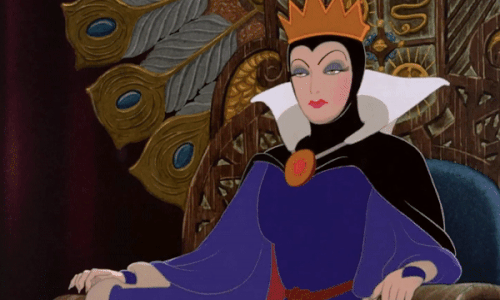


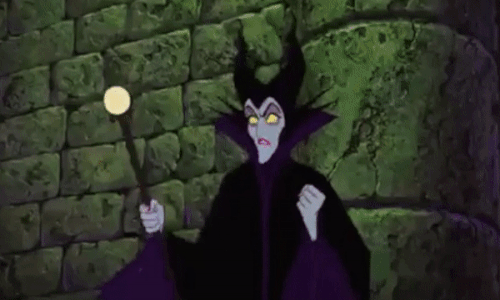


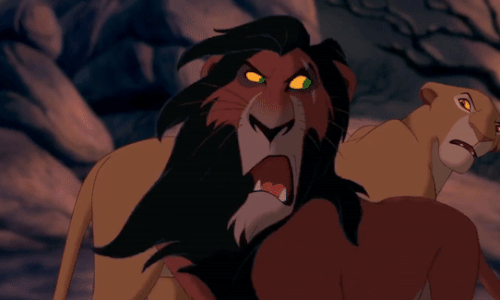



Tyrant Terror
So I know it’s no surprise to my closest friends and fellow Disney fans on Tumblr that I have a strong, deep affinity for villains, including those by Disney. And over the last several months, the more I wrote about King Runeard in my Frozen II analyses, the more I realized what made him a tyrant, albeit a secret one, and that led me to think about other villains in the Disney animated canon who were tyrants.
The thing is, while most historical tyrants were people of royalty, you don’t necessarily have to be a monarch in order to be a tyrant. The definition of a tyrant isn’t limited to being a KING or QUEEN who is openly cruel, hostile, harsh, uncaring, oppressive, persecuting, and unjust towards the people they rule. I mean, that is one way to express tyranny, and probably the most famous way it is and has been done. But what it really means for a person to be called a tyrant is being in a position of power, authority, and/or control over other people and MISUSING, to the point of ABUSING, that position, and often for that tyrant's own selfish desires rather than in the best interest of the people being ruled by the tyrant.
So from Snow White and the Seven Dwarfs to Frozen II, there are a handful of tyrannical antagonists who are indeed monarchs, such as the Queen of Hearts, Prince John, and Scar, but also plenty others who are not. There are tyrants who are corrupt government officials, such as Governor Ratcliffe, Frollo, and Bellwether, and even those who wield magic, such as Maleficent, Ursula, and Jafar. And like the villainous monarchs, the non-monarch villains prove themselves as tyrants all because they abuse their positions of power, magic or non-magic power, and authority that they have over other characters. In fact, there are even a couple of heroic characters who start off more as protagonist villains because they display tyrannical behavior before they become better people. On the contrary, the main antagonist enemies of these tyrant heroes serve as darker reflections of what the latter characters could have become had they not learned the error of their ways.
Below is my list of all the villains from Walt Disney Animation Studios that I perceive as tyrants, from monarchs to government officials to sorcerers, and what scenes in their respective movies depict them displaying tyrannical behavior. I even listed villains that would have become tyrants had they succeeded in their longterm goals.
Monarchs
The Evil Queen: Though we never see her actively governing her kingdom on screen, the abuse that the evil queen displays in her authority over Snow White by dressing her stepdaughter in rags and forcing her to work as a maid in an attempt to make her (Snow White) unattractive makes her a tyrant for sure. Furthermore, the way she mocks the skeletal remains of a prisoner in her dungeon suggests the queen is indeed a cruel, tyrannical ruler.
Queen of Hearts: If we want to consider the epitome of a true tyrant that is a monarch from Disney, it can be safely assumed that that role belongs to the Queen of Hearts. While every resident of Wonderland is insane in some way, the Queen is the most dangerous one of all by being the ruler of the land. An egotist extraordinaire, she loves to get her way, insisting that “All ways are MY ways!” and enjoys hearing the words “Yes, Your Majesty”. The Queen outwardly abuses her authority and power over her subjects by becoming furious over even the smallest of matters, during which she loses her literally explosive temper and flies into violent rages. She is also extremely irrational and unjust in making decisions, primarily by utilizing executions as her only and immediate solution to any problem, especially whenever she feels someone has wronged her, while also refusing to let the individuals she wants beheaded explain their sides of the stories. Enraged upon seeing her white roses painted red, when she misses a shot in croquet, and when she becomes the target of a prank caused by the Cheshire Cat, the Queen sentences those she deems responsible to death by beheading. All of this proves just how much she persecutes and oppresses the residents of Wonderland, instilling only fear and intimidation into their hearts. (A pun that is VERY much intended by me, the Queen of Puns! 😆😆😆)
Prince John: While possessing a short temper that isn’t nearly as explosive and violent as that of the Queen of Hearts, Prince John is displayed to be extremely incompetent as the ruler of England during the time that King Richard is off fighting in the Crusades. Stingy and greedy, the prince continually finds ways to rob and swindle his people in pursuit of wealth for himself. John shows absolutely no care that the harsh laws he decrees to gain more money drive the citizens of Nottingham into poverty and starvation, and he even cruelly mocks them on their poor states by saying, “Rob the poor to feed the rich!”. After the villagers start making fun of him with the song “The Phony King of England”, John punishes them by further increasing the tax payments. Soon everyone in Nottingham is stripped of their money and they are put in prison due to their inability to pay their taxes.
Horned King: Even though the Queen of Hearts projects herself as the ideal example of a royal tyrant, she is far less evil and scary than the Horned King. A skeletal creature with green, rotting flesh, the Horned King is completely frightening in appearance and in personality. Malicious, cruel, malevolent, sinister, power-hungry, megalomaniacal, ruthless, and merciless, he is the epitome of a tyrant who is nothing but purely and completely evil. His goal is to find the infamous Black Cauldron and use its powers to unleash an army of immortal warriors called the Cauldron Born in order to become immortal and conquer the world.
Scar: Denied a legitimate chance to succeed Mufasa as the King of the Pride Lands once Simba is born, Scar schemes to have both of them killed to become king. After murdering Mufasa and believing that Simba has been killed as well, Scar ascends to the throne. However, because he allows the hyenas unrestricted hunting rights in the Pride Lands, their overeating leads to a shortage of food, and a drought leads to other animal herds moving away. Ultimately, these events turn the kingdom into a barren wasteland under Scar’s reign, leaving it completely devoid of green vegetation, water, and food sources. Incredibly lazy and incompetent as a ruler, and caring about nothing except the power and authority that being king gives him, Scar refuses to accept that his allowance of the hyenas overeating is what leads to the destruction of the Pride Lands. He instead blames it on Sarabi and the other lionesses since the hyenas complained to him that they refuse to go hunt. When she suggests they leave Pride Rock to survive, Scar obstinately rejects the idea, not at all caring that he has essentially sentenced them to death. He argues that his place as king puts him in the right for whatever he decides to do: “I am the king! I can do whatever I want!”
King Runeard: In his life, Runeard openly presented himself as a peaceful, generous leader to the people of Arendelle AND the Northuldra. But Elsa discovers from his snowy manifestation in Ahtohallan that he did not trust the Northuldra just because they followed magic. Despite his kingdom having seen him as a benevolent ruler, the face the figure of Runeard makes as he sneers "of a king!" implies that only really cared about himself as well the power and authority he had in being a king. Therefore, he secretly misused and abused it whenever the opportunity came along. This is displayed perfectly when Runeard had the dam constructed in the Enchanted Forest, presenting it as a gift to the Northuldra. He claimed that it would strengthen their land, but admitted only to the second-in-command that the dam’s effects would be just the opposite. This was all part of Runeard’s subtle plan to destroy the Northuldra, as he feared they would try to usurp him and take over Arendelle using their magical ties.
Government Officials/Authority Figures
Lady Tremaine: Like the evil queen before her, Lady Tremaine has control and authority over Cinderella once the latter’s father dies, and misuses it by turning Cinderella into her servant. Day after day for ten years, Lady Tremaine orders and bosses Cinderella around, forces her to do every single bit of housework and menial task for her and the former’s daughters, and subjects the poor girl to an endless cycle of abuse and torment. When Cinderella is accused by Anastasia of putting Gus under the latter’s teacup, her stepmother refuses to let her explain the truth and unfairly punishes her with extra chores. Later, Lady Tremaine falsely promises Cinderella she may attend the ball if she finds a suitable dress and finishes her chores, but gives her chore after chore to do to keep her from working on her dress. After Cinderella appears wearing the dress her mouse and bird friends fixed up for her, Lady Tremaine subtly and cruelly manipulates Drizella and Anastasia into destroying it so that she can appear to be fair in her side of the bargain (”If you can find something suitable to wear”) while simultaneously keeping Cinderella from going to the ball in the first place. The following morning, when she realizes Cinderella was the mysterious girl who danced with the prince at the ball, Lady Tremaine follows her stepdaughter up to her room and locks her in to prevent her from trying on the glass slipper when the Duke arrives with it.
Sheriff of Nottingham: Despite not being the main antagonist of Robin Hood, the Sheriff of Nottingham is as much of a tyrant over the town as Prince John is to it and the entirety of England. This is because he is abusive, ruthless, and completely unsympathetic towards the people’s poverty and continually demands that they pay their taxes, regardless of what other problems they may have that hinders them from doing so. It is because of the Sheriff’s harsh decree of taxes, and then by that of Prince John once the latter takes up residence in Nottingham, that the town’s citizens are driven into poverty. The cruel, immoral way the Sheriff collects taxes includes forcing out the coins Otto had hidden in his leg cast, not caring that his act was causing the blacksmith pain from his broken leg, confiscating the one farthing Skippy had been given for his birthday and insincerely wishing him a happy birthday, and taking the single farthing that was in the Friar Tuck’s church's poor box and laughing as he did it.
Ratigan: A notorious crime lord, Ratigan is the leader of a gang of thugs comprised primarily of mice, but also including a bat named Fidget, who is his second-in-command. Although they willingly help their boss with his crimes, they also participate out of fear for their own lives. Ratigan is an abusive tyrant to his minions and threatens to feed them to his cat Felicia if they ever do something that angers him, even if it occurs unintentionally. This is shown after one of his drunken thugs calls him a rat during "The World’s Greatest Criminal Mind”, and Ratigan threatens his other minions with the same fate if they do not keep singing. Ratigan’s latest scheme is to take over London by murdering the Mouse Queen during her Diamond Jubilee celebration and secretly replacing her with a lifelike robot. He and his thugs (who are disguised as royal guards) infiltrate Buckingham Palace and kidnap the Queen, who is taken to be fed to Felicia by Fidget. As the Diamond Jubilee takes place, the Robot Queen names Ratigan as her new "Royal Consort", and Ratigan, dressed in an ornate robe, immediately presents himself in front of the gathered citizens of Mousedom, terrifying them. He then proceeds to read over his long list of tyrannical laws, one of which is a heavy tax policy for people he deems "parasites", including the elderly, infirm, and children.
Governor Ratcliffe: A completely unscrupulous and greedy man, Ratcliffe leads John Smith and other sailors on an expedition to Virginia to find gold, but he secretly plans to keep all discovered riches for himself. Upon their arrival to America, he forces all of the settlers to dig around their encampment, but refuses to do any manual labor himself out of his own sheer laziness. When no gold turns up in the searches, Ratcliffe becomes greedily convinced that it is because the Native Americans are hoarding it. He refuses to believe John's claim that there is no gold around the land, claiming that the Powhatans’ land is his land for the taking and that he makes the laws. After John is captured by the Powhatans, as they believed he murdered Kocoum, Ratcliffe takes it as the opportunity to take the non-existent gold from them, but claiming to his men that it is a rescue mission.
Judge Claude Frollo: Perhaps the darkest and most malevolent of all Disney Villains in animation (aside from the Horned King), Frollo uses his position as the Minister of Justice in the city of Paris to enrich himself and persecute anyone and everyone he considers inferior. He especially holds a deep-seated hatred for the gypsies and plots to eradicate them from the city. Despite his dark deeds, Frollo refuses to find any fault within himself and he truly believes he is a good person who is only trying to rid the world of sin and malice. Any time he commits a crime or is about to do one, he makes excuses to justify them, saying he is doing it in the eyes of God and that his victims are the ones who are really at fault. After chasing and murdering Quasimodo’s mother since he believed that the bundle she was carrying was stolen goods, Frollo attempts to murder Quasimodo since he believes the latter’s deformity makes him an unholy demon. Years later, after trapping Esmeralda in Notre Dame and upon discovering that she has escaped, he launches a ruthless manhunt around the city to find her, burning down the houses of anyone suspected of sheltering gypsies (including an innocent miller and his family, who survive thanks to Phoebus’s intervention) and interrogating gypsies who are captured. During the climax, Frollo makes the excuse that Esmeralda has proven herself to be a witch and will be executed by burned at the stake as her sentence.
Hades: The reluctant ruler of the Underworld and Lord of the Dead, Hades abuses his authoritative role by subjecting his lackeys Pain and Panic to harsh mistreatment whenever they fail a task assigned to them and any other time they do or say something that angers their boss. The two imps only put up with Hades’s abuse not so much out of loyalty to him, but out of deep fear for him. When he discovers that the two did not succeed in killing Hercules as a baby, Hades furiously grabs both Pain and Panic by their necks and chokes them as he demands they explain themselves. Later, after Hercules becomes a famous hero in Thebes, Pain and Panic adorn themselves with some of the hero’s merchandise, much to their boss’s complete ire.
Shan Yu: The ruthless yet respected leader of the Hun army, Shan Yu is an extremely dark, merciless, and dangerous individual determined to take control of China. His thought-to-be impossible feat of getting through the Great Wall to invade China soon makes him notorious and feared throughout the entire country. In his journey to the Imperial City, Shan Yu and his army destroy one village, then slaughter the entire Imperial Army and residents in another village at the Tung Shao Pass in the mountains. He and five of his elite soldiers are the only ones who survive a snow avalanche caused by Mulan. When the group arrives at the Imperial City and take control of the palace, Shan Yu orders the Emperor to bow to him, and decides to kill him when the latter adamantly refuses to do so.
Turbo: Initially believed to be the ruler of the game Sugar Rush, King Candy is secretly Turbo, a racer from the old game TurboTime who was believed to have died after his game was permanently unplugged. Having stolen the throne from Vanellope Von Schweetz, the true ruler, Turbo turns her into a glitch and makes himself the ruler of her kingdom. While he is viewed as eccentric and flamboyant, yet jovial and benevolent, to his subjects, Turbo is extremely obsessive and possessive of his new royal status. He continuously lusts for power and authority and goes to great lengths to secretly abuse his position, not just by allowing the other racers to ruthlessly torment Vanellope, but especially by keeping Vanellope from racing so that she cannot regain the role he had stolen from her.
Bellwether: The epitome of the famous phrase “a wolf in sheep’s clothing”, Dawn Bellwether pretends to be sweet, meek, and friendly to successfully hide her true prejudiced, ruthless, embittered nature. Initially the overworked assistant mayor of Zootopia to its mayor Leodore Lionheart, Bellwether secretly hates him and all predators, viewing them as nothing more than savage, dangerous monsters. In her scheme to overthrow him, take control of the city, and drive all predators out of Zootopia, Bellwether becomes the leader of a secret organization of sheep terrorists who create a serum from night howlers to turn predators feral. This would give the illusion that they were biologically reverting back to their "primitive savage ways" and eventually be regarded as too dangerous for society, allowing only prey animals to take up the entire population. However, in her goal to become the mayor of Zootopia, rather than subjecting Lionheart to becoming savage, Bellwether instead develops her plot to ensure that he is removed from office and his positive reputation amongst the citizens is ruined, allowing her to rise to power in his place.
Magic Users
Maleficent: Known as The Mistress of All Evil, Maleficent is a ruthless tyrant who rules her own subjects at her home, the Forbidden Mountain. Using her dark magic, she continuously abuses her power and authority over her minions, particularly whenever they display incompetence and stupidity. This is shown when Maleficent flies into a rage and attacks them with her magic upon realizing that, over the last 16 years in their search for Aurora, they were only looking for a baby, not realizing in their idiocy that Aurora would be growing up.
Ursula: Known for her dark reputation as a sea witch, Ursula was banished from Atlantica by Triton. She explains in “Poor Unfortunate Souls” that she uses her magic to help merfolk attain their deepest desires and only imprisons them if they can’t keep their side of the bargain. However, after she takes Ariel’s voice away and turns the latter into a human to try and win Eric’s heart, Ursula reveals she has no intention of letting Ariel follow through with kissing Eric to remain human. She proves herself to be a tyrant because all she really does is backstab the merpeople with whom she makes deals in order to ensure that only HER desires are met! When she bargains with Triton so he will surrender himself to her in exchange for Ariel’s freedom, Ursula steals his crown and trident, then grows to giant size, declaring herself the ruler of the entire ocean.
Jafar: Unbeknownst to the Sultan of Agrabah, his Royal Vizier Jafar plots to take control of the kingdom, and he needs the Genie of the lamp from the Cave of Wonders to pull off this feat. Once the lamp is in his possession, Jafar succeeds with his first to become sultan. But after Jasmine and her father refuse to bow to him, he wishes to become the most powerful sorcerer in the world to have an even greater amount of power. During his brief reign, Jafar proves himself to be a tyrant by turning Agrabah into a dystopian wasteland, dressing the Sultan as a living marionette and allowing him to be abused by Iago, and making Jasmine his own slave girl.
Tyrants-Turned-Heroes
The Beast: From the time he is cursed and until he finally starts to soften, the spoiled behavior the prince had before his curse remains. He is aggressive, rude, impatient, and frequently and easily loses his temper when something annoys or irritates him. Primarily due to his short temper, the Beast acts like a tyrant towards his servants because he is mean and cruel to them as he gives them orders, which makes them deeply afraid of him. Only on some occasions do they openly rebel against him or talk back to him, such as Mrs. Potts ordering the Beast to act more like a gentleman around Belle, and both her and Lumiere deciding to feed Belle despite being told that she was not allowed to eat unless she ate with the Beast.
Kuzco: In the beginning, Kuzco is very arrogant, lazy, selfish, and self-absorbed, viewing himself as superior to all simply for being the emperor. He rules his empire completely without the best interest of his people and always seeks to have his way, never showing any concern over the chances things could turn out badly for other people involved. This is shown when he sets his sights on building his summer home of Kuzcotopia on the top of the hill where Pacha, Pacha’s family, and other villagers reside. Since the plan will only benefit himself, Kuzco shows absolutely no care or concern that destroying Pacha’s village to build Kuzcotopia will render the residents homeless.
Would-Be Tyrants
Gaston: From what I described about him in “Bride and Prejudice” with his growing obsession with Belle and his low, inferior views of women, there is no doubt in my mind that, had Gaston succeeded in marrying Belle and starting a family with her, he would have run his household like a tyrant. He would be very controlling to the point of being physically abusive to his wife in order to get her to obey every single one of his commands and orders. Like many of the tyrants I listed above, Gaston would undoubtedly use fear and intimidation to keep his wife in her proper place of being beneath him, and he would instill these same feelings on to his own children.
Yzma: Her ire drawn after Kuzco remorselessly fires her, a furious Yzma decides to kill him so that she can take over the empire. While Kuzco is initially selfish, callous, and uncaring towards his staff and people living in his empire, he learns to change his ways by the end of the film. Had Yzma succeeded in her goal, she would have been far more of a selfish, ruthless tyrant than Kuzco was at first. This is evident during her introduction scene, which is one of many times she governs the empire whenever Kuzco is not present. As a peasant complains to her that he and his family are suffering from limited food sources, Yzma spitefully says his problem is of no concern to her, and that the man should have realized this ahead of time.
Hans: While taking over as temporary ruler of Arendelle in both Elsa and Anna’s absence, Hans wins the hearts of the people by acting as a kind, caring, benevolent ruler during the harsh conditions brought on by Elsa’s magical winter. Though he reveals his true, dark nature to Anna and his plot to take control of Arendelle, the fact that he earned the trust and respect of the Arendellians suggest that Hans could truly have been a very worthy ruler. However, now that we have Frozen II and it revealed that Runeard was actually a malevolent tyrant behind the same kind of benevolent facade that Hans used, there is no doubt in my mind that had he succeeded in stealing Arendelle’s throne, Hans also would have become a ruthless, power-hungry, selfish tyrant in secret.
#Miscellaneous Disney#Disney#Disney Villains#Disney Villain#villains#villain#tyranny#tyrants#tyrant#The Evil Queen#Queen of Hearts#Prince John#Horned King#Scar#King Runeard#Lady Tremaine#Sheriff of Nottingham#Ratigan#Governor Ratcliffe#Judge Claude Frollo#Hades#Shan Yu#Turbo#Bellwether#Maleficent#Ursula#Jafar#my stuff#mine
217 notes
·
View notes
Text
Honest Hearts: A Rough Rewrite
Hey! I’ve been working on an Honest Hearts rewrite-type-thing for a bit and figured I’d solicit feedback/assemble a post to store some of these ideas.
A detailed explanation of the premise is under the cut, but I’ve made this as a more interesting reintroduction to major locations, along with the characters who live there. I also have some lore consisting of letters, scripture, and holotapes that’s still in the early stages, along with a complete companion wheel for Salt-Upon-Wounds (he’ll follow you around for a little if you decide to help him out). Endings are now finished as well. I’m not planning on expanding this into a full mod, but I’m assembling everything in Twine so I can utilize branching dialogue and mimic skill checks.
I want to keep adding to and editing this because I’m having fun with it, so if you have any input, let me know!
Essentially, the story proceeds as written up until the point where Daniel sends you to either kill the White Legs or destroy their war totems. You quickly realize that their camp is deserted, at which point Salt-Upon-Wounds ambushes you, convo-locks you, and tells you that there’s an entirely different side to things here that you might not have considered.
Factions
The Mormons have established a theocracy in the Utah called Deseret, with New Jerusalem - what was once Salt Lake City - as its capital. Large numbers of them survived the initial apocalypse due to their pre-War focus on strong community ties and disaster prepping; over time, they have returned to the model of self-sufficient agrarianism that characterized the historical Mormon state of Deseret that existed in Utah in the 1800s. Their President, who wields supreme executive power, is also their Prophet. The Mormons believe he communes directly with God, but there’s some discontent in New Jerusalem over his hands-off approach to foreign policy and unwillingness to assemble a standing army. The Elders of the Priesthood are pushing him to allow for some kind of formal military to oppose what they see as revived versions of their ancestral enemies: America, Rome, and the “Lamanites” (this is what Mormons call Indigenous Americans; the “Lamanite” idea has historically been used as a justification for racism, and I’m reflecting that here because it’d be kind of heinous not to). In more than a few respects, Deseret serves as a mirror to the Legion and an exploration of the other side of the coin re: the tactics utilized by colonial empires to present themselves as legitimate while still claiming territory and steamrolling the opposition.
The White Legs are now more explicitly Shoshone, and I’m relying most heavily on the Timpanagos Band for names and historical inspiration (apparently the question of whether they’re Ute or Shoshone is pretty controversial, but I’m sticking with what the Timpanagos have said about it until someone corrects me). After migrating south in the wake of the Great War, the White Legs eventually settled in Ogden, about a day north of New Jerusalem. Initial interactions with the Mormons were friendly, but as New Jerusalem grew and its need for farmland and resources increased, tensions rose before culminating in open violence in around ‘76 or ‘77. Deseret’s party line is that the White Legs conducted a “raid” on one of their settlements and had to be driven away from Ogden; the White Legs claim the violence was not a raid, but a revenge killing after a Mormon killed a young man and was found not guilty by Mormon legal authorities (this is a theocracy, so “legal authorities” here can be understood as indistinct from “the church”). The Mormons established a new settlement on the ruins of Ogden, which they called New Canaan, and the White Legs fled to Salt Lake, where they have been dwindling in number ever since. Salt-Upon-Wounds’ plan to seek entry to the Legion is a last-ditch attempt to save his people from eradication when their neighbors and the land itself seems intent on killing them (not that that makes all the war crimes ok, which is a sentiment you’ll be able to express to his face if you engage him in conversation).
The Dead Horses are a pastoral society from out of Dead Horse Point, and are split almost down the middle along political lines. The more conservative, religious side opposes intervention in Zion. Graham desecrates the corpses of his enemies as an intimidation tactic, and because the Dead Horses’ religion is so eschatological and heavily focused on properly cleaning, preparing, and interring the dead, a big chunk of the religious leadership opposes him on that basis - they think his tactics are ungodly. They’re also worried that any Dead Horses who die in Zion and are interred there will be severed from their connection to Dead Horse Point and doomed to a separate, lonely afterlife. The younger, more progressive elements of the tribe are less traditionalist, sometimes less religious, and overall not as concerned about Graham’s treatment of the dead because of the potential benefit they might be able to derive from him. Follows-Chalk is their de facto leader, and while the Dead Horses don’t formally allocate political power, he’s among the most influential people in the informal tribal leadership. Most of the Dead Horses who’ve come to Zion have done so either because they support Follows-Chalk politically, or for practical reasons - namely, Graham’s access to a dizzying number of guns and his willingness to give them to anyone who’ll fight for him.
The Sorrows are now a terrace-farming agrarian society instead of hunter-gatherers (Zion has a lot of agricultural potential, and there’s already a few farming plots in the Sorrows camp you see in-game, so it’s not a huge departure from the canon). I’m keeping their Mexican heritage, but I’d like to give them some Ainu influences as well - partially for selfish reasons, but also because bears are extremely important to our culture and theology, which gels well with the elements of Sorrows culture and religion that appear in the canon. I’d like to keep the Survivalist because I like him, but I want to expand on their faith. One of the ways I’m doing that is by deciding they can still read English, even though they no longer speak it; it’s basically their equivalent of liturgical Latin. They’re also rigidly matriarchal and in contrast to the Dead Horses (who eschew formal political hierarchies) or the White Legs (who elect a chief who serves until he dies, is deposed, or voluntarily abdicates), leadership positions are allocated through matrilineal primogeniture; Waking Cloud inherited her position from her mother. Religious leadership, likewise, is only available to women. You’ll be able to talk to Waking Cloud about some of the ways this framework is incompatible with the Mormon perspective, and can appeal to her desire to retain power.
Characters
Canon Characters
Joshua Graham and Daniel are largely unaltered except through the addition of lore that gives insight into their cultures, motives, and pasts.
All three tribal leaders (Follows-Chalk, Waking Cloud, and Salt-Upon-Wounds) are either given new backstories, a different set of motives, or different approaches to one another/Graham and Daniel. They’re also explicitly leaders now - what power Graham and Daniel have, they derive from whichever tribal leader they’ve managed to attach themselves to. Of those three, I’m altering Waking Cloud the least and Salt-Upon-Wounds the most. Like I mentioned, I have a companion wheel for him so far and the bones of two other conversations - one, where you meet him for the first time, and the second, where you speak to him before the final battle. Will link as I finish them.
Original Characters
Each tribal leader now has a rival or right hand within their tribe so I can reflect the different ways the values of a specific community can express themselves.
Follows-Chalk’s primary rival among the Dead Horses is a man who refuses to tell you his name. That’s because using someone’s name in casual conversation is considered unspeakably rude, and the fact that Follows-Chalk is willing to share his own with you is, to Mysteriously Named Old Man Character, yet another sign of how disrespectful and laissez-faire Follows-Chalk is about their shared traditions. Old Man Character is suspicious of you initially, but if you speak to him more he starts to warm to you. The goal is to give you a sense that this he’s pretty xenophobic but for good reasons, and despite his political conflicts with Follows-Chalk, has a lot of love for him. He just wants what’s best for his family, and Follows-Chalk is part of that, even if Mysteriously Named Old Man Character thinks he’s making the wrong choices.
Kiiki is Salt-Upon-Wounds’ right-hand woman and intended as a contrast re: the approach to war and its costs. Salt-Upon-Wounds has done some horrible things and gets a fair bit of dialogue about that, but Kiiki is willing to go even further than he has with very little prompting. Her chief copes with what he’s done by trying to assure himself that the ends of war are worth the cost; Kiiki deals with it by trying to convince herself that the means weren't so bad, actually, and that anyone who isn’t nailing corpses to walls is being naive. All of that makes her sound pretty shitty, but she’s nowhere near as devoted to the idea of a Legion alliance as Salt-Upon-Wounds is. It only takes one very low Speech check to convince her that going Legion is a bad move, and one of the paths involves assassinating Salt-Upon-Wounds and installing her as the new leader as a way to stop the White Legs from joining Caesar. I haven’t added this path to the ending Twine because I’d like to finish Kiiki’s dialogues before I do that.
I’m replacing White Bird as the Sorrow’s spiritual leader with a woman named Imekanu. She’s incredibly old, savvy, and knowledgeable - she’s never been outside Zion, but has a store of books in English, Spanish, and Japanese that have allowed her some insight into what caused the war, if not the current state of the world. She’s also aware of the Survivalist’s origins - not because she’s entered any of his hideouts, but because she’s read over the scriptures and has correctly identified them as letters. Her perspective is that the Father in the Caves was a human being, but that doesn’t diminish his religious value. She sees him as analogous to the Buddha or a Catholic saint: human, sure, but still with access to some deeper truths about the purpose of man and the nature of human goodness. You’ll discover that this idea (that the Survivalist was a holy man rather than a literal god) is the most common perspective among the Sorrows, and you can talk to her about how this departs from Daniel’s perspective that the archetypal Father is divine, not human.
Quests
Each tribe has a specific quest that will either lower or bypass some of the penultimate checks that will determine your ending (people are more likely to believe what you’re telling them if you’ve already won their trust).
The Dead Horses: Joshua Graham has been putting the heads of the fallen up on pikes across Zion. The Dead Horses’ religion is deeply concerned with proper treatment of the deceased, and Graham’s decision to desecrate the corpses of his enemies goes against virtually everything they believe. The old man who won’t tell you his name asks you to take the heads off of the pikes and bury them deep in Zion, and to bring Follows-Chalk with you so you’ll have someone to tell you how to treat them properly. Over the course of the quest, Follows-Chalk will share some of his own beliefs about death, and you’ll have the opportunity to share your own. If you complete this quest without sabotaging it, Follows-Chalk will be willing to betray Graham to the White Legs before the final battle.
The Sorrows: This is basically just Ghost of She, but after defeating the Yao Guai you’ll discover a holotape revealing that the girl wasn’t killed by the bear, but by one of the murderers from Vault 22. Waking Cloud will speculate that maybe the Yao Guai wasn’t the ghost of the little girl at all but some other force that wanted to push you to discover the truth. If you wait until the end to tell Waking Cloud about the death of her husband, you’ll have to pass a Speech check of 75 to convince her you’re telling her the truth; completing this quest drops the check to 50.
The White Legs: Salt-Upon-Wounds will ask you to help him sabotage the Mormons’ preparations for the battle. If you help him with this, it’ll drop the Speech check for you to convince him to leave from 100 to 80. It’s not necessary at all to get the tribal confederacy ending, but a new note will appear in your inventory if you finish it and meet a couple other requirements (asking him certain questions, not attempting that one Speech check about religion, etc).
Endings
I’m trying to incorporate as much variety as possible, but there are three main ending paths: siding with the White Legs, siding with the other two tribes, and peace. The basic idea is that the outcome is predicated less on your direct intervention, and more on how other people act based on the facts they have available to them. Most of your influence is through your choices to hide or reveal key pieces of information, and the skill checks you need to access certain endings are less you convincing a character to do something and more convincing a character to believe you’re telling them the truth. There’s one major exception to this, it requires maxed Speech, and the ending it gives you is markedly bittersweet because you’re trying to get a guy to act against his own best interest. I’m writing all the endings up here, and will probably edit them as things change. The post where I explain them in more depth can be found here.
And that’s the story so far! Thank you for reading, and again: if there’s anything here you think is poorly-conceived, let me know. Thank you to @baelpenrose, who’s a grad student in the history of the American West, for helping me workshop a lot of this stuff. If you’ve got expert knowledge on any of the concepts I touch on or are personally a member of any of the groups I’m describing, please feel free to hmu: anon is on, and you’re always welcome to DM me. I’m just doing this for fun, but I still want it to be as not-shit as possible.
#fallout new vegas#fnv#honest hearts#honest hearts rewrite#probably should have started with initial conversations but oh well lmao
58 notes
·
View notes
Text
Phase One: Thor
Since I was looking up my past live-blog of the novel and realising how annoying and repetitive reading through it all is because of my having structured it as a bunch of reblogs, I’ve decided to organize it all into one long-ass post instead. In case anyone else wants to read it in the future. Or in case I decide to re-read it. Because I’m hilarious. 😅
SO WITHOUT FURTHER ADO
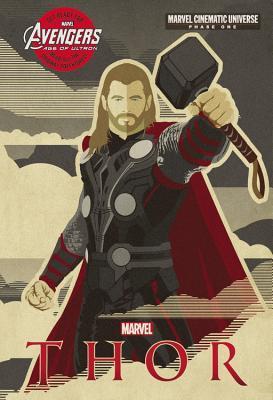
My Hilarious Yet Wrathful Overview Of Phase One: Thor, Redux
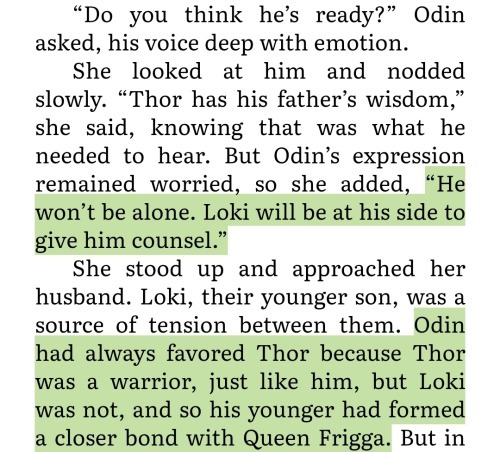
—

If your son who’s to become king requires a babysitter to not screw it all up and also the idea of him being king is stressful enough to put you into a coma, maybe, uh… reconsider doing that? Just a thought.
But you see here why Odin was so deadset on Thor becoming king, despite him being ill-suited for the role. It’s not about what’s best for Asgard; it’s about personal legacy. Thor is Odin’s mini me, and Loki is very much not. There are places within the text where Odin laments Thor “lacking his father’s wisdom” (he’s definitely inherited your humility, though, Odin!), but he hopes for Thor to grow into a “wise king” like himself. Whereas he holds no such illusions (lol, pun) that Loki will ever take after him.
now with tag commentary! #this scene is in the script and both novelizations #(though in reading this novel seems to just be a more complete version of the junior novel? #idk i'm confused because they're supposedly written by different authors but so far the text is identical) #and it drives me insane each time i read it


“Haha, I’m a warmongering piece of shit, isn’t it funny?”
I know, I know. I try to cut Asgard some slack for being such a militaristic culture because social changes happen slowly and when you live for thousands of years per generation, it makes sense that your views on things like war would be regressive. The text says Odin has ruled Asgard for tens of thousands of years (so much for taking Loki’s “give or take 5,000 years” line literally; sure, the Odinsleep would have extended Odin’s lifespan, but by that much? Idk).
Still, fuck Odin. Especially since he’ll eventually try to shame Loki for doing the same thing he’s fucking boasting about here. And on a much smaller scale too.

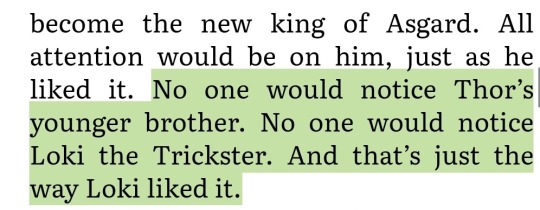
…is it, though?
I actually think Loki’s relationship with being the centre of attention is really interesting in its complexity and we don’t discuss it enough. I’ve said this before, but he strikes me as the sort of person who craves attention but also wouldn’t really know what to do with it if he had it. He craves it as a result of neglect, because he’s never been shown recognition or validation. This is why he seems to revel in it in Stuttgart, even in (or maybe especially in?) his brainwashed state. But he also frequently comes across as pretty introverted and has horrible self-esteem, so I think on another level, sustained, genuine attention would make him feel kind of uncomfortable. Loki seems to believe that in order to be loved or respected, he has to literally be Thor, though. And Thor has always been the centre of attention, so for Loki, attention is synonymous with respect.
I find Loki’s relationship with wanting attention especially fascinating because I too both crave and fear it. As a borderline, I need it. When no one is paying attention to me, I lose my sense of identity. I feel as though I literally cease to exist. It’s excruciatingly painful. And yet, I have no authentic sense of self; I’m just a chameleon, and the closer people get to me, the more likely it is they’ll see behind my mask. They’ll realise it’s all a show and that I’m actually no one. And then they’ll leave. I can’t help wondering if that’s how Loki feels sometimes too.

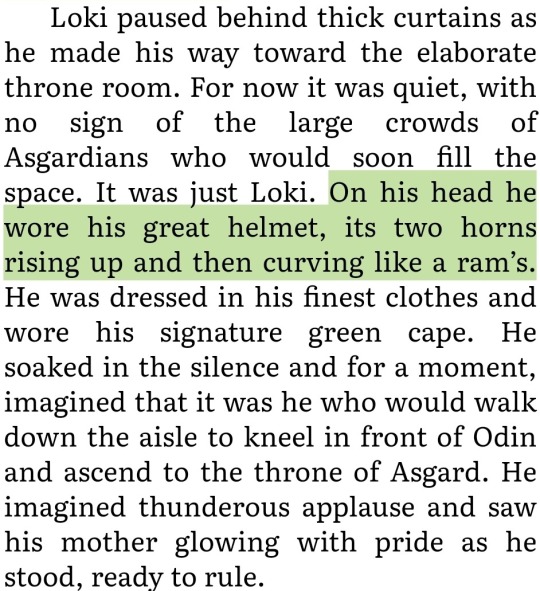
Wait, what? You mean goat. His horns are shaped like a goat’s. This is a ram:

This is a goat:

This is Loki:
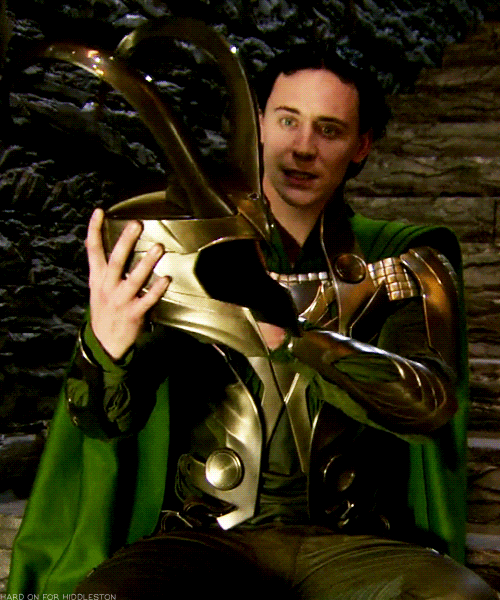
Do you see now? They’re like a goat. Not a ram. Not a cow. A GOAT.

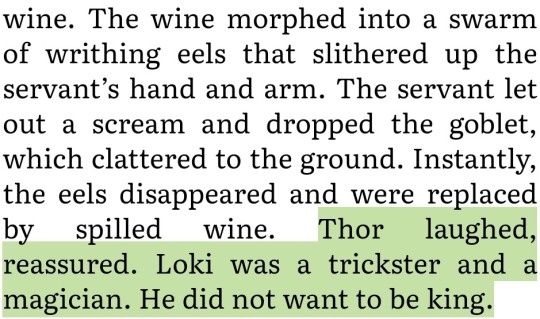
This book was written before Ragnarok was a thing, so it may be unfair to connect the two, but it still seems worth noting that it was Thor who reduced Loki to being no more than a trickster to begin with. “You could be more,” my ass. Loki’s problem has never been that he was one-dimensional; it was always that the people in his life, including Thor, refused to see any other dimensions to him. Which makes those words particularly cruel—as if they aren’t cruel enough already, what with the physical torture and all.

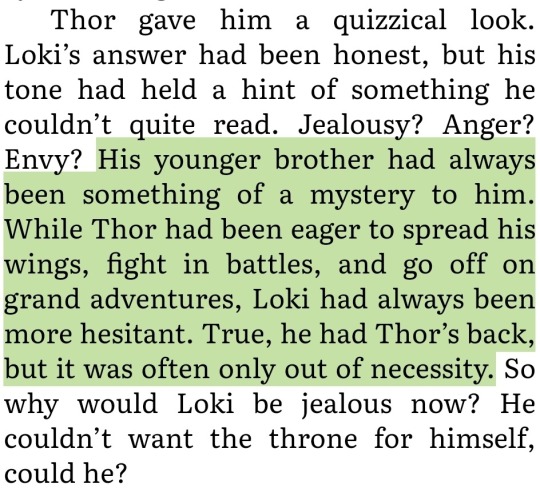
Always happy to have cause to point out that
Loki was on Thor clean-up duty their whole lives; he certainly was not trying to kill Thor.
People like to point to Loki’s attempted genocide of the Jötnar and attempted(-ish? lol) conquest of Earth as proof that he’s some kind of violent maniac. But in a little place I like to call reality, Loki was historically far less aggressive and bloodthirsty than his peers.

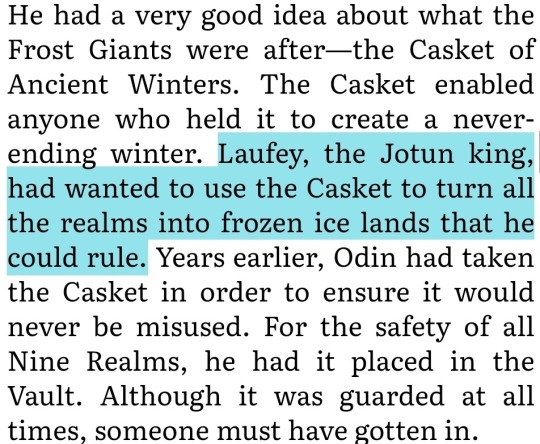
Question: why is one conqueror evil and the other is righteously entitled to ruling over the Nine Realms?
Asgardian exceptionalism FTW

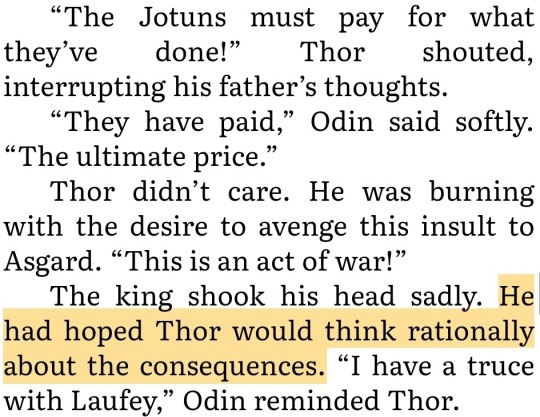
I can’t even begin to imagine what would lead you to expect such a thing, Odin. 😂
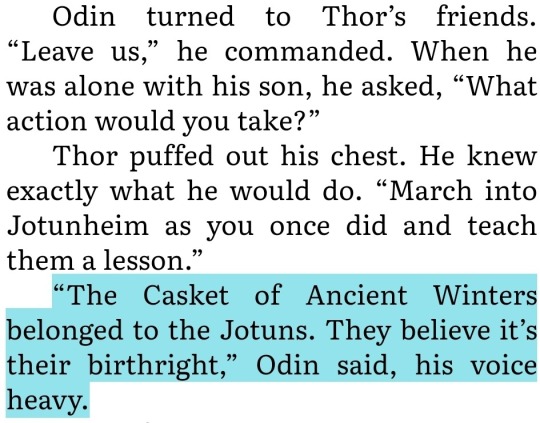
Uh, ‘cause it is?? And also their planet is MELTING without it??
This is all only within the first two chapters, btw. Lmao

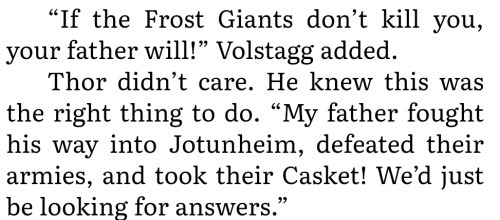
—
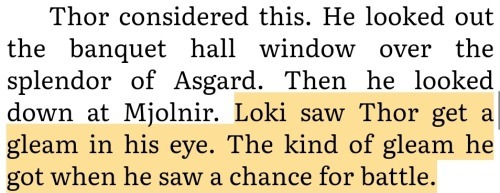
—
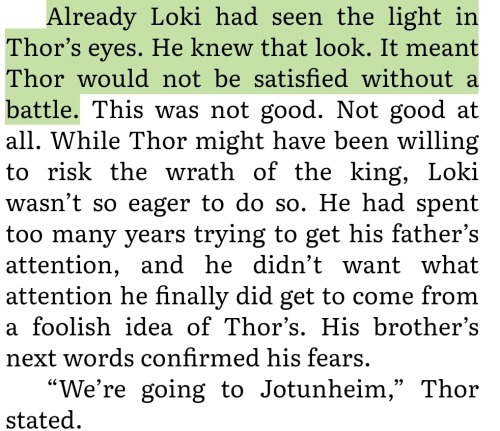
—
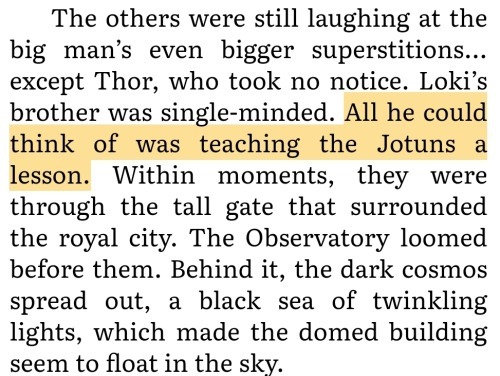
“Looking for answers,” my foot.

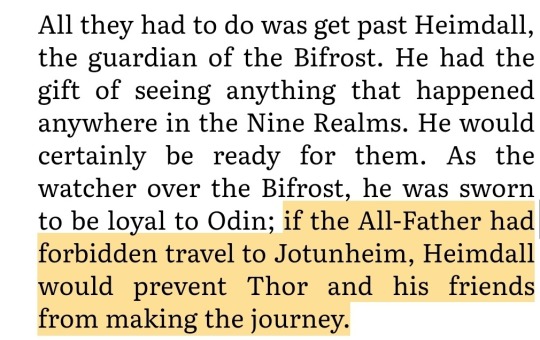
YOU WOULD THINK SO, WOULDN’T YOU??
#i mean unless you knew heimdall #he only commits treason on days that end in y

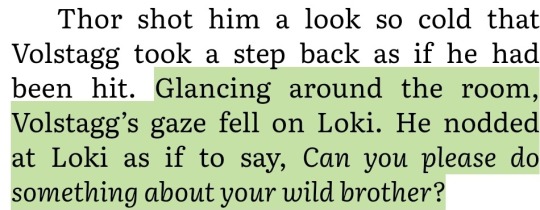
—
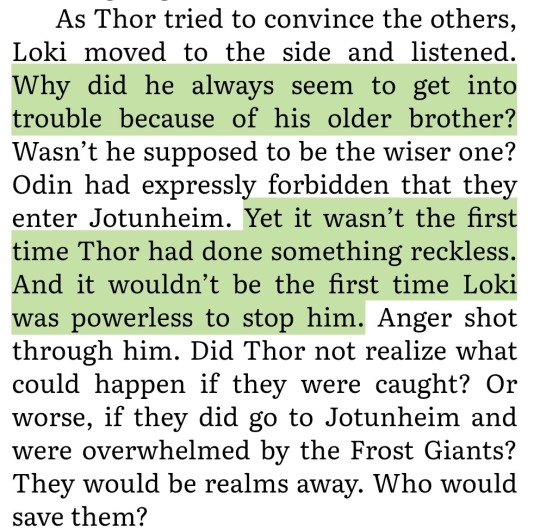
—
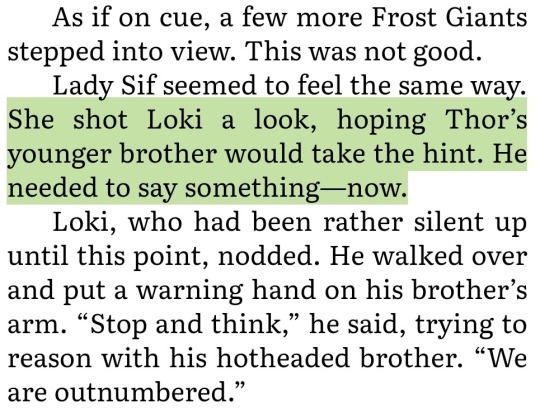
What’d I say? Thor clean-up dutyyyyy

Just wanna remind everyone that this
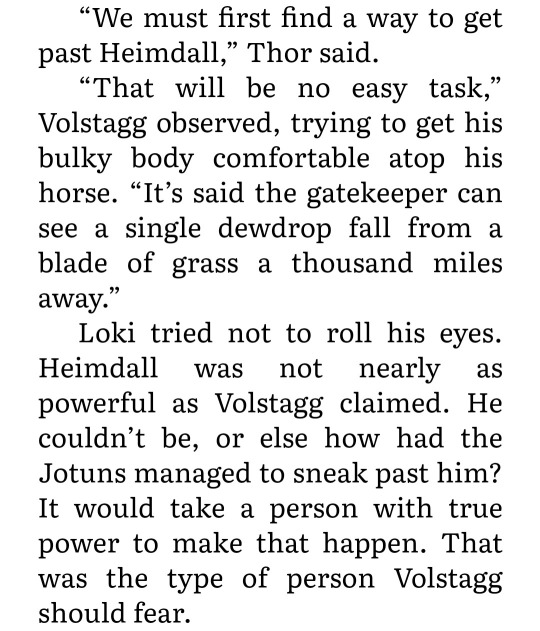
is why he’s smiling during this scene
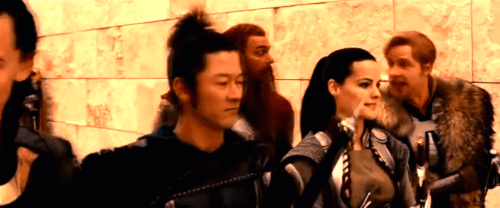
because it makes me laugh every time. 😂

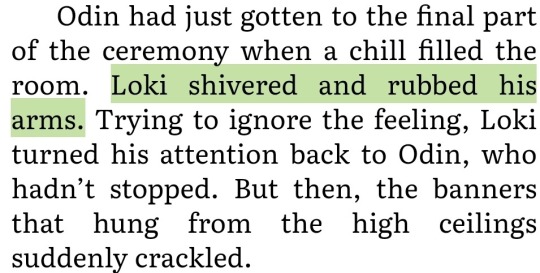
—
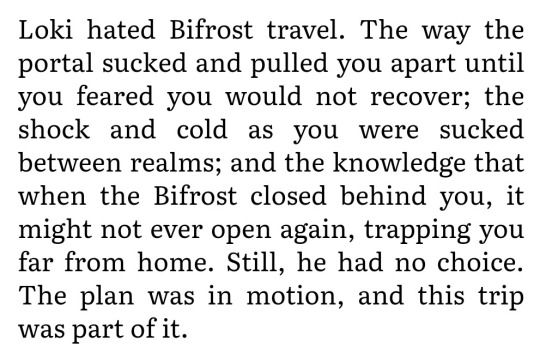
My heart breaks every time I remember that second excerpt because literally ALL OF IT happened to him when he survived falling through the wormhole. My poor boy. 😭
But also of note… Loki gets cold (and also does not like being cold). This interests me because 1) as many are aware, the prevalent headcanon that Loki has a low body temperature irritates me and 2) it possibly(?) lends weight to the theory that he may not be fully Jötun, whether by virtue of his birth or Odin’s spell.

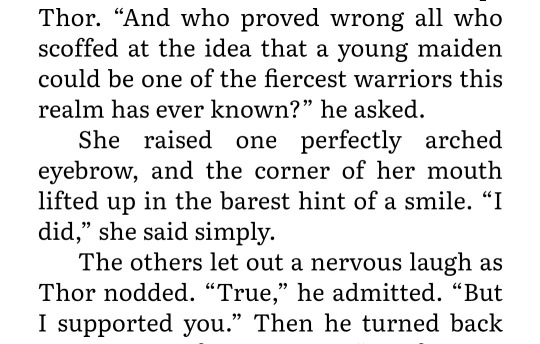
Haha, look at this Feminist Icon™ trying to take credit for his female friend’s accomplishments! Truly inspiring.
#for some reason the ragnarok lovers have somehow decided that thor is both a feminist and lesbian icon #whatever that means 🤷♀️ #and i'm still trying very hard to figure out why #is it literally just because he *says* he respects women or whatever in that dumb rambly conversation with valkyrie?

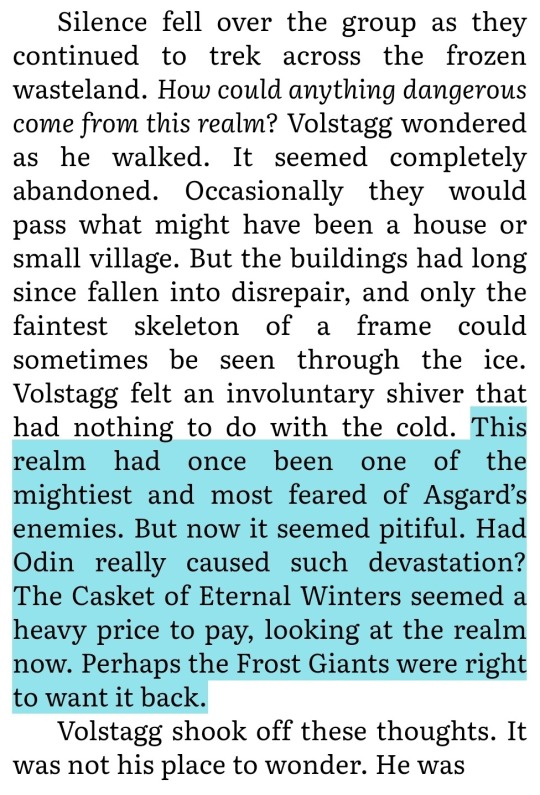
Ooh… you were so close to getting the point, Volstagg. So close. Take your tongue off Odin’s boot for just a couple minutes longer.
Also, the author just forgot the name of the Casket. How did this book get published? 😂

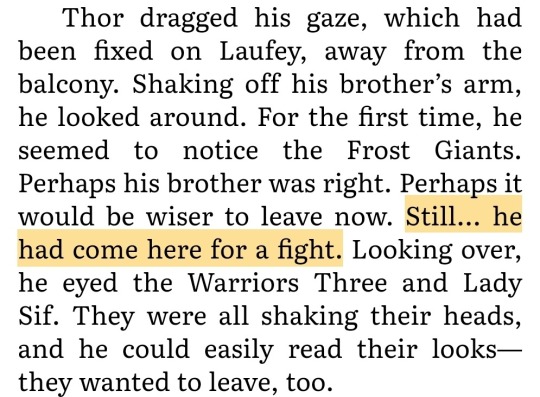
JUST LOOKING FOR ANSWERS, HUH?

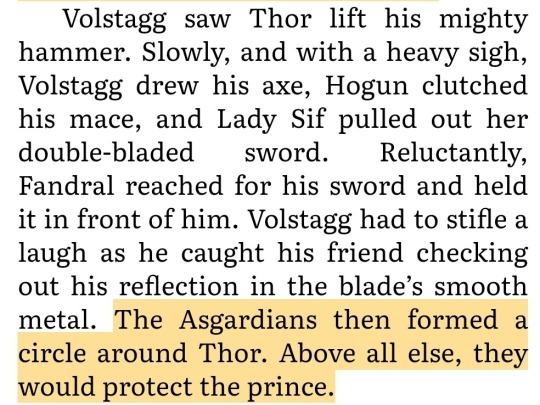
Because fuck Loki, amirite? He, uh… he’s a prince too, you know.
Also… Fandral, you dweeb 😂

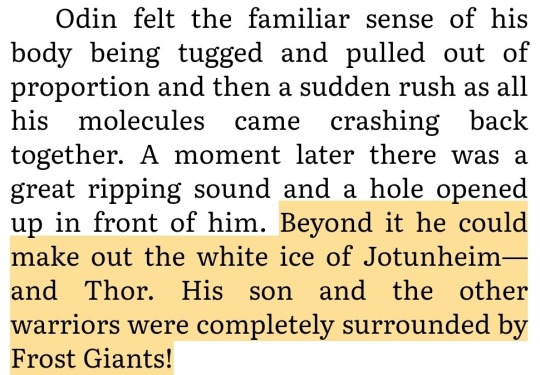
…am I reading too much into this, or did Odin just literally forget that Loki exists?
On the other hand, the author also seemed to forget Loki existed for most of this chapter, so who knows. 🤷♀️

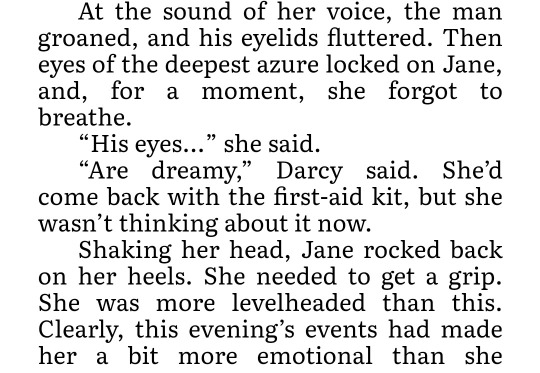

lmao @ Jane immediately trying to convince herself she’s too rational to be attracted to a stranger

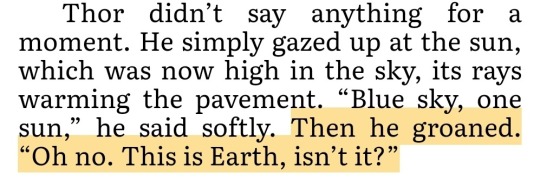
Honestly, though, big mood.

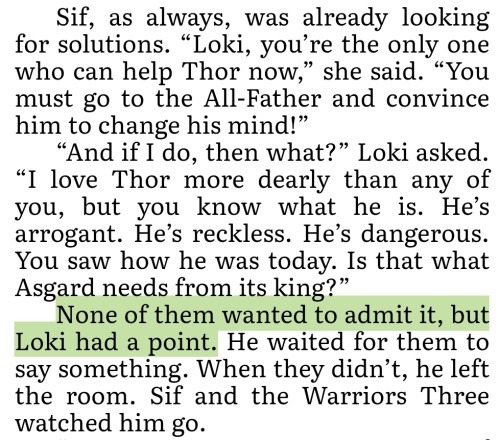
Just your periodic reminder that Thor’s sycophantic friends KNEW Loki was right and decided to throw him under the bus anyway.

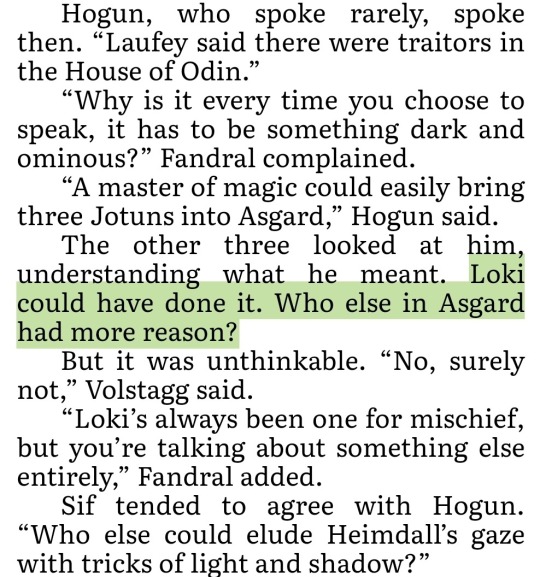
Just as I’ve always said: That was it. That was their ENTIRE rationale. That Loki *could* have done it, therefore he must have. Please tell me these people have nothing to do with Asgard’s justice system.
…lol, jk, Asgard has no justice system.
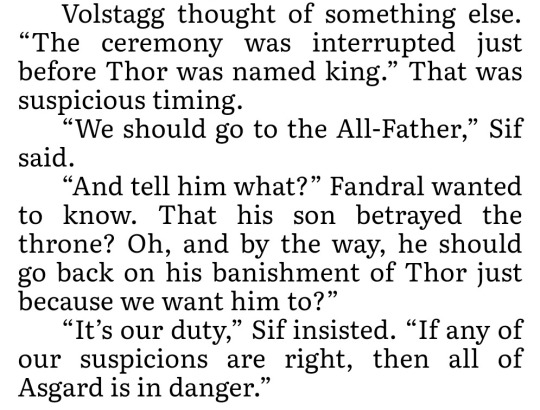
Ok, first of all, no.
Second: thank you, Fandral. You’re a self-absorbed cad, but also evidently Thor’s least stupid friend.
Thirdly, how…? First, it was, “Loki arranged all this because he’s jealous of Thor.” Now they’ve suddenly jumped all the way to, “All of Asgard is in danger.” What exactly does Sif think Loki is planning? He’s gonna, what… assassinate Odin and then sell Asgard to the Jötnar?

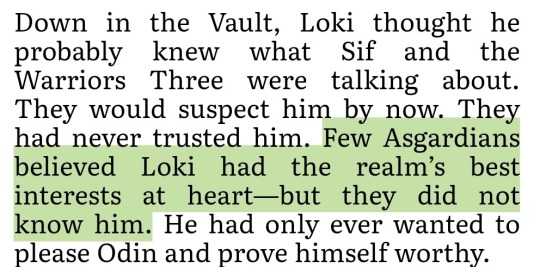
—
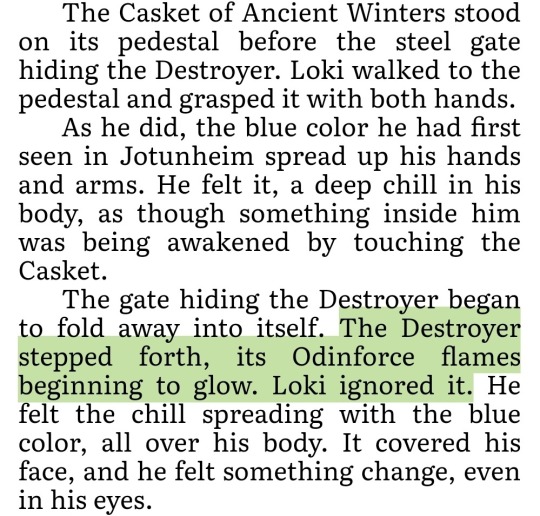
Please stop hurting me.
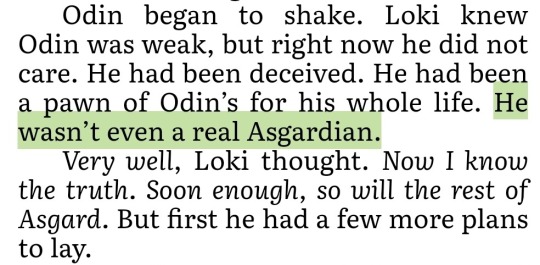
Just so there’s no confusion: this one sentence explains everything Loki did for the rest of the movie. It explains how a person who has been historically non-aggressive suddenly transforms into a warmonger. To prove himself a real Asgardian, like his brother and father and grandfather.


—
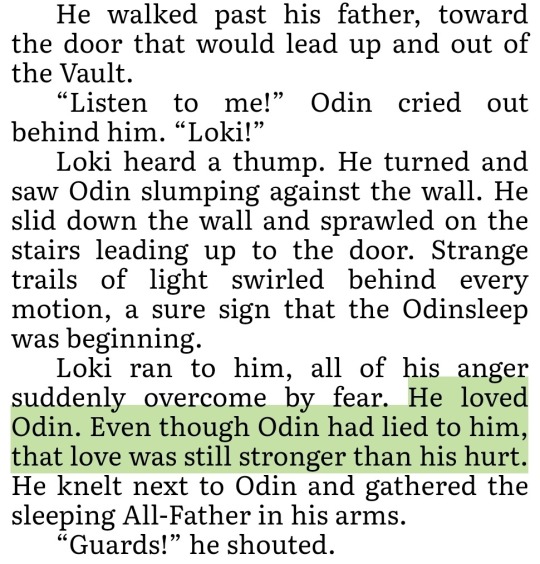
…why did Odin fall into the Odinsleep in two completely different scenes in this book? I’m super confused.
Also, we really need to talk about how cruel it is of Marvel to keep forcing Loki to prove his loyalty again and again and again when he’s been doing so almost literally since we met him. And by “we need to talk about it”, I mean I need to tie Kevin Feige and co. to a chair and spend a minimum of five hours lecturing them on how poorly they understand their own fucking character.


Let’s just be clear here: they’re talking about Loki. They’re saying Loki, their LEGITIMATE king, is an enemy of Asgard, based on evidence so paper-thin it’s practically invisible. Just… please, let that sink in. Take a moment to appreciate how utterly fucked up that is.

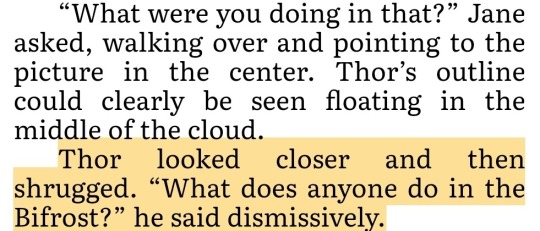
I’m sorry (not really), but Thor was so much funnier before Ragnarok.
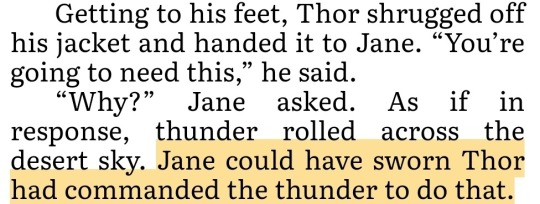
This scene has always kind of bugged me. If Odin removed Thor’s powers, how come he can still control the weather? Confusing.

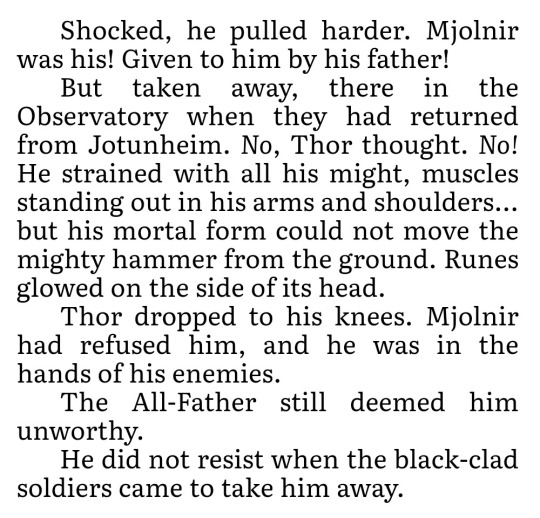
So what exactly was Thor’s plan anyway, before he realised he couldn’t lift Mjölnir? He was just gonna call on Heimdall to help him commit treason AGAIN, show up on Asgard against the expressed command of his king, and… Odin would just shrug and be like, “You got me, son! I guess I can’t keep you down. Welcome home!”?
…I mean, I guess that more or less is what happened in the end, but it’s hard to imagine it would have still gone down that way without all the stuff that happened with Loki. Idk.
#look what i'm saying is... thor is not exactly a thinking person #no one on asgard is a thinking person #except loki but he's crazy now so he's also thinking somewhat poorly lol

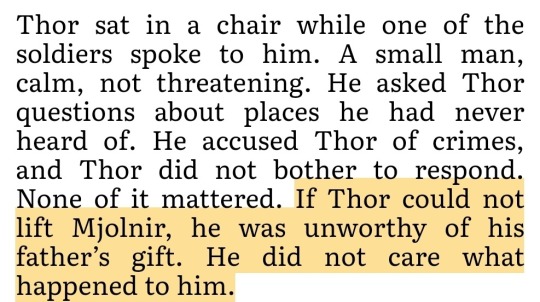
Cool, Thor. Now imagine feeling that way for ONE THOUSAND YEARS and develop a little fucking empathy for your brother.
But you won’t.
You’ll brush off his feelings of worthlessness as “imagined slights”. 😒

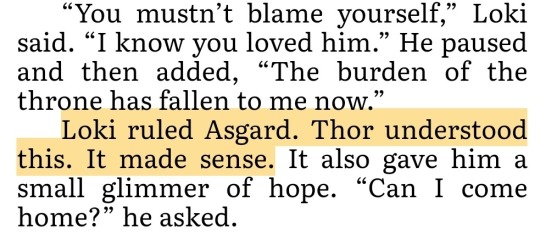
Nice that somebody knows how the royal line of succession works, I guess…

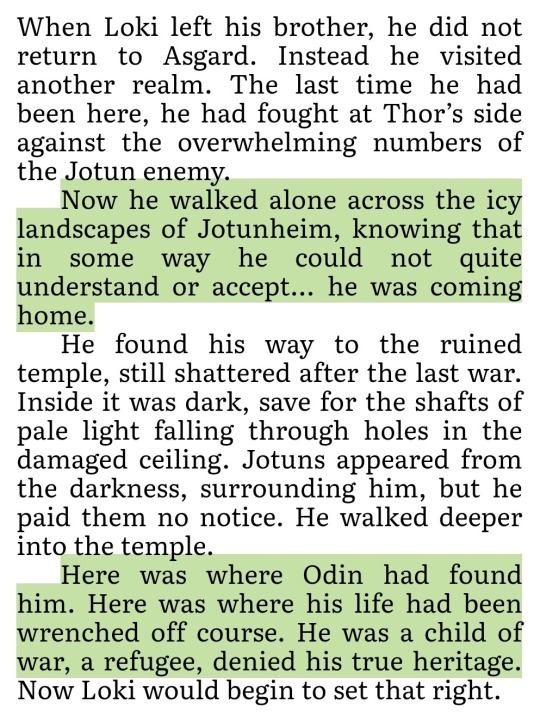
That sound you hear? Yeah, that’s just my heart breaking. NBD.


First, they mislabelled it the Casket of Eternal Winters. Now it’s the Cask of Ancient Winters. Author must have been thirsty when they wrote this. Lol

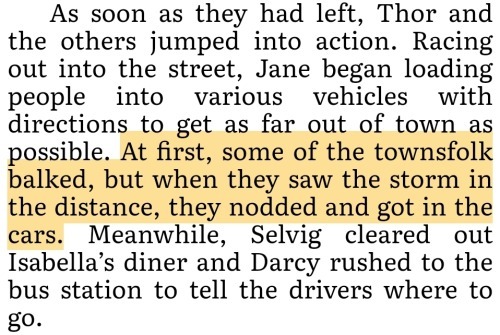
Look, not to nitpick, but this is not the recommended procedure when you see a storm that you don’t believe is of supernatural origin coming. I’m just saying. Lol

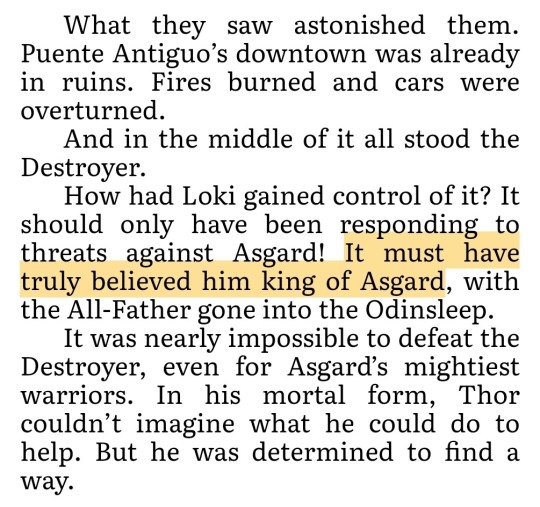
Uh… ‘cause he is?? And your pals are committing treason AGAIN, Thor, so it technically is responding to a threat to Asgard. Just FYI.
Anyways, this is an important point that doesn’t get made often enough. People want to act like Loki illegally usurped the throne somehow, but even without the deleted scene that explicitly shows Frigga passing rulership to him (a scene which is, for some reason, entirely skipped over in this book, but whatever), understand this: Loki could not have controlled the Destroyer unless he was legitimately King of Asgard. The fact that he’s able to do so is irrefutable proof that his rulership is valid.

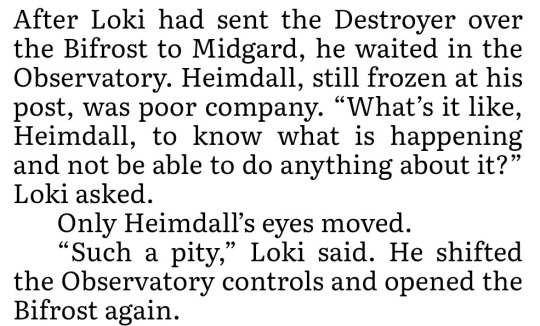
lmao you little shit

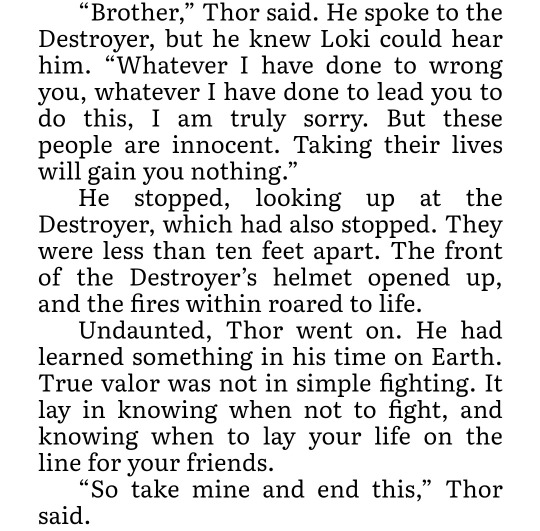
So… here’s my issue with this scene (and with Thor as a character): He always assumes that Loki’s acting out specifically to hurt him. That Loki’s entire life and thought process revolves around Thor. He does it in this scene, he does it in The Avengers… it’s just a chronic thing with Thor. Everything is viewed through the lens of Loki inexplicably hating him.
But that’s… just not accurate. Yes, Loki harbours a lot of jealousy towards Thor. But that’s not what’s happening in this scene. Loki is not trying to kill Thor here because he wants him dead; he’s doing it because Thor (and his friends) are getting in the way of Loki completing his ultimate goal. Loki tried to solve this problem non-violently, by lying about Odin being dead. It’s Thor’s friends who all but forced his hand by going behind his back and trying to bring Thor back to Asgard against Loki’s (and Odin’s!) direct orders.
For all the humility he’s learned in the past few days, this entire speech is still really all about Thor. About assuming that Loki’s doing this for personal reasons, because he holds a grudge against Thor for some unknown reason. This is implicit in his request to “take [my life] and end this.” It never even occurs to him that his friends are traitors to the Crown and Loki, as King of Asgard, is perhaps justified in pursuing them.
It also needs to be acknowledged that Thor’s apology here is hollow, even if it’s ultimately coming from his heart, because he has no idea what he’s apologising for. “Whatever I have done to wrong you” is not an apology. An apology addresses specific hurtful actions taken and commits to not repeating those mistakes in the future. Thor cannot commit to not repeating the hurtful things he’s done, because he doesn’t know what he’s done. Despite his best intentions, what Thor is doing here is actually kind of manipulative. He’s not addressing any substantive issue between the two of them; he’s just trying to talk Loki down. And it ultimately fails not because Loki doesn’t care or because he wants Thor dead, but because it doesn’t actually change anything.
Finally and only semi-relatedly, we should maybe at some point talk about the fact that Loki, who is stated to be a master tactician, has displayed a weird pattern of hardly ever being as lethal as he could be. He freezes Heimdall in place instead of killing him outright; he backhands Thor with the Destroyer instead of incinerating him; he, well… *gestures vaguely at almost the entirety of the first Avengers movie* Anytime the violence is even a little bit personal, he seems to hedge. Odd behaviour for somebody who’s supposedly super evil.


I’m sorry, I know I’ve pointed it out at least a hundred times before, but I just can’t encounter this scene in any form without taking a moment to appreciate how underrated and hilarious it is.
I also genuinely wonder how many Ragnarok stans who have accused me of having no sense of humour, have failed to laugh at moments like this one. Kinda feel like if you need to have the comedy spoonfed to you in the form of ass jokes, maybe you’re the one whose sense of humour is lacking. 🤷♀️

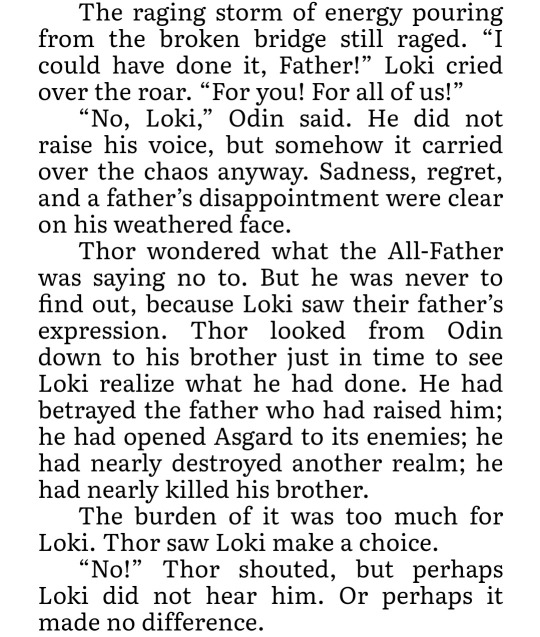
Let’s be super clear: this is not what happened. Loki did not betray Odin; he was betrayed by Odin. He did not open Asgard to its enemies; he attempted, misguidedly, to destroy Asgard’s enemies. And he most certainly did not commit suicide out of a sense of guilt.
I’m not saying Loki did nothing wrong, nor am I saying he feels no regret for the lives he has taken. What I’m saying is there’s no indication that he believes he betrayed Odin or Asgard in the process. Which makes perfect sense, because he didn’t. Everything he tried to do was for Odin and Asgard. It was misguided and horrible, yes, but it can hardly be classified as a betrayal.
The insurmountable burden on Loki is not that he did terrible things, but that no matter what he does or how hard he tries, Odin will never look at him with anything but contempt. Consider once more these passages from the very beginning of the book, at Thor’s coronation:
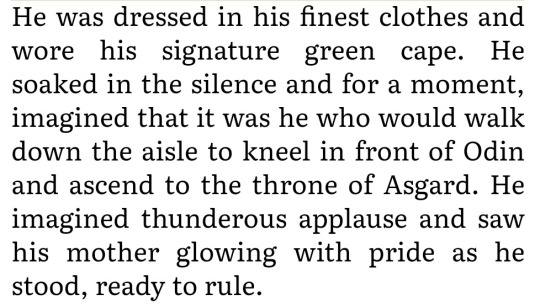
—
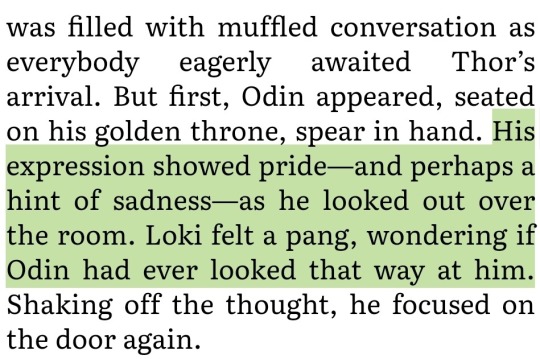
Consider that this book goes to great pains to point out that Odin favours Thor because Thor is a warrior like him. And yet even when Loki embraces that, even when he acts more war-like than ever before, Odin rejects him— just as he always has.
There is a reason why this moment is the last time Loki will ever call Odin his father. Because he realises once and for all that, no, nothing he tries will ever be good enough; no, Odin won’t ever look at him with pride. That is Loki’s burden. That is why he lets go.

The epilogue is really just two pages of making me want to vomit.
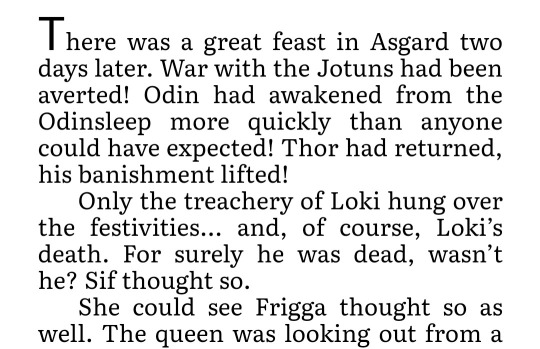
There’s your party where Thor and a certain subset of the fandom insist that Loki was mourned. There’s barely an indication here that anyone even perceives his demise as a negative thing.
“[Sif] could see Frigga thought [Loki was dead] as well” also contradicts the tie-in comic for TDW, so I don’t know what the author is on about there. Unlike the majority of Marvel comics, the tie-in comics are canon to the MCU, so it’s a bizarre statement to make.

COULD YOU SMEAR THE DEAD* ABUSE VICTIM A LITTLE HARDER, PLEASE? Fucking hell.
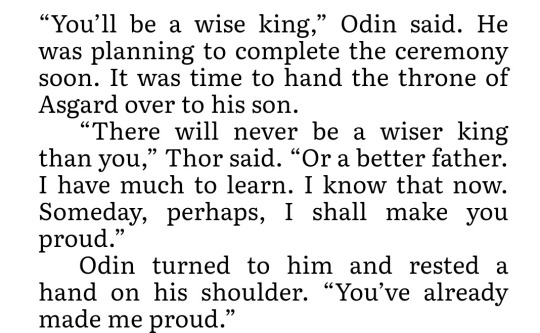
No matter how many times I encounter this scene, in whatever format, I still fail to become desensitized to how disgusting it is. I realise there’s a good chance that whatever version of events Thor has been told was twisted at best; but how you can look at a man whose son has just committed suicide under any circumstances and say there will never be a better father than that guy, is utterly beyond my capacity to understand.
And Odin’s “you’ve already made me proud” line just feels like extra salt in the wound because, again, Loki let go because he realized Odin would never say those words to him. And yet they come so damn easily when it’s Thor.
Fuck this entire family so much. I think I hate them more than Loki does. Sometimes I wonder what he would think about that. How he would react to knowing that not only is he actually loved, but that he’s so loved that people are genuinely furious at the way he’s been mistreated. That there are people who regularly devolve into full-on rants because they just can’t contain how much anger they have towards the people who hurt him. I think he’d have a hard time wrapping his head around that concept, tbh.
Anyways, to end on a not-completely-depressing note, I’m still waiting for someone at Marvel to explain how Loki knew what Thor said in this scene after plummeting into a wormhole. ‘Cause he references this conversation as Fauxdin at the end of TDW. So like… ?? Did he steal Odin’s memories before he erased them? Because that would be… kind of neat, actually. And very clever. Not entirely ethical, of course, but it’s Odin, so fuck ethics.
WELP, THAT’S IT. Thanks for following along with my dumbassery, hope you enjoyed yourselves. Lol
#phase one: thor#loki meta#thor meta#odin's a+ parenting#frigga's b+ parenting#topic: thor and loki's broken relationship#loki#thor#heimdall#lady sif#the warriors 3#jane foster#ragnarok cinematic universe#mcu#topic: asgardian hypocrisy#topic: asgardian militarism#topic: odin's family dynamic
129 notes
·
View notes